#it's still my most favorite story and I love ending in its own merits from the Disney adaptation
Note
((The Sins would turn to sea foam at permadeath? Is that a nod to Hans Christian Anderson's Little Mermaid?))

//WHOOPS, I had to change my answer when I was corrected about the nature of sea foam: Sea foam is organic, and thus, is not eligible for what the Master's thralls can become! This means sea snow, crumbling bleach coral, pearls, and other elements of the ocean with organic origins. As much as I'd argue to keep in sea foam because of how melancholy the scenario would be, there is a big reason why we're not keeping it--and, actually, just sticking to salt in general.
For one, keeping the change to something inorganic removes all and any traces of who or what the Thralls are in the eyes of God or the Universe, be it the Abrahamic God, or the Eastern faiths, etc. There is no reincarnation. There is no 'one of the universe'. There is no Heaven, no Sheol, no Seven or Nine Hells, no Diyu, no Niraka, no Brahman. The soul is bound to the Master, no ifs, ands, or buts. The fate of the thralls is an affront even when it comes to animism--the spirits of the sea are bound to a devil who shouldn't have them to begin with. But because of the deal made, and with no body to return to, the Master will flaunt the full severance of human souls from the human world like a middle finger and a flex.
Secondly--and this is a further elaboration of the previous point--salt has its origins from the earth. Be it volcanic activity or good ol' weathering from the coastlines, the ocean and the earth share dominion of salt in a cycle that is natural to the world. The Master turning his thralls into salt is a way of saying "I take what is mine, fuck you". The Master turning thralls into salt is the biggest demonstration of the adage "The sea takes what it claims". It is the ultimate finality of man, born of earth, from the uncaring and ever crushing oceans who dare to grace the waves.
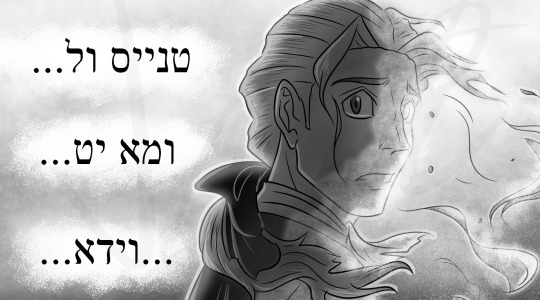
Of course, we have the religious element regarding Lot's Wife looking back to the destruction of Sodom. We don't know if there are salt-related folklore around the world other than how pure it is and that it can thwart off evil. Given how the Master is a salty bastard, we can safely say using salt to drive him off (or holy water, for that mater) is pointless.
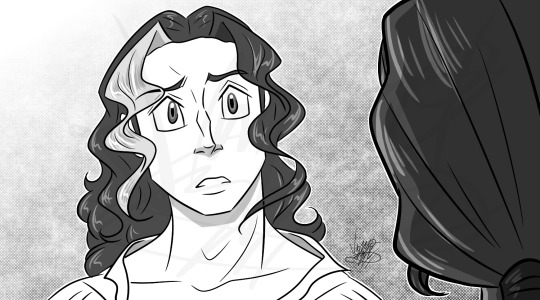
Worth noting: if a thrall's hair turns white, they are in danger of permadeath, as the Master would begin not caring to maintain his hold of that thrall's immortality. Guy's hair having a white streak is a warning to the Seven that the Master will not forget, nor forgive, any further transgressions against him. He can take away the Seven at any time. It's only through his "grace" and "mercy" they are allowed to walk on Earth still.
#But otherwise yes#if we kept the sea foam angle then it would have been a nod to the original Hans Christian Anderson's The Little Mermaid#it's still my most favorite story and I love ending in its own merits from the Disney adaptation#so much I made my own take but outside of Denmark with with cigar smoking hairy tree demons and fireflies instead mermaids and sea foam x3#[Fate of the Seven]#[Fate of the Damned]#[Fate of the Doomed]#[Fate of the Saved]
2 notes
·
View notes
Text
Kim's Place in the Mafia: Novel vs Show
The one thing I can say without a doubt in my mind is that from the crumbs we get of Kim and Chay from the book and show, these two are obsessively in love with each other. So I'll say that now and get that squared away.
And I know, most of the fandom detest the book due to its problematic authors and will never read it, and that's completely valid. Furthermore, I will say now that the book is trash and hardly coherent at times. But as my favorite English scholar for Ancient Rome, Mary Beard, once said: "It's trash...but it's very valuable trash."
For what it's worth, reading the book at least once can provide a more nuanced understanding of why the showrunners made the changes they did in the show. The changes in and of themselves makes for a more cohesive story (SOO MUCH MORE COHESIVE), but it also goes without saying that a lot of the events in the show remain faithful to the novel, so in that regard, there is some merit to be had.
Finally, when I say the novel is "trash", I mean the narrative itself, not necessarily the translation (although it's not perfect by any means). If anything, I'm grateful for the translators who took the time to translate this novel into English, since translation is a thankless job most times in fandom (lookin' at you, MDZS). As I speak no Thai whatsoever, I can’t give an informed opinion on DAEMI's technical writing abilities, since I'm not a native speaker, nor am I the book's target audience.
But, I digress.
The more I reread the book (in all its trash glory), the more I find myself questioning Kim's views in regards to how he sees himself as part of a mafia family. 🤔
In the book, Kim is a lot more accepting of his place within the mafia, despite his initial tendencies of disappearing on his guards and staying away from the main house. In fact, that pretty much changes once Chay enters the picture.
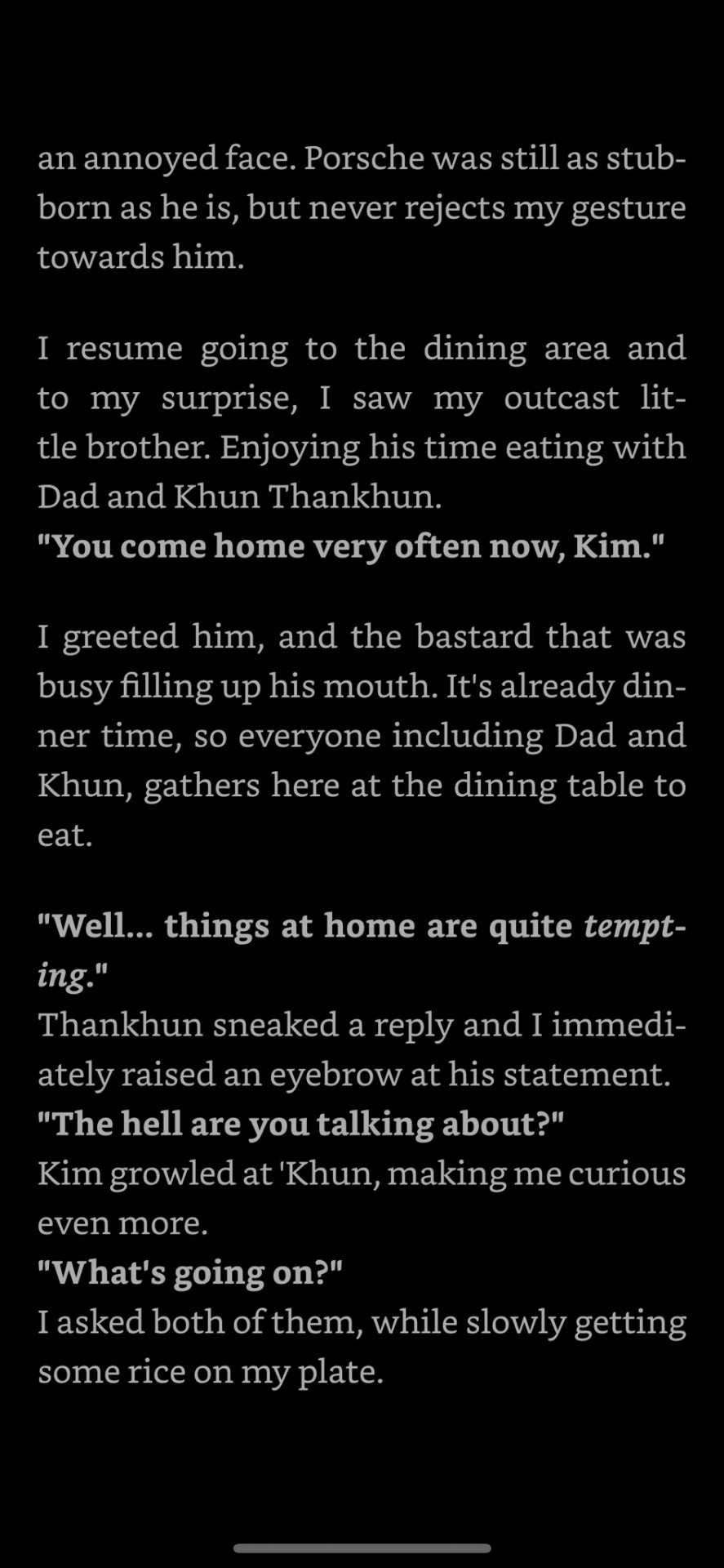
Gotta love a Kinn who's curious about his little bro's love life. XD
Kim is firmly settled into the fold of the family business (if that scene in the secret warehouse is anything to go by) and there’s a scene in the beginning of the book where Korn obligates all 3 sons to dress up in some fancy suits and visit their chocolate factory, since he’s particularly keen on getting it off the ground. This shows that although Kinn is set to inherit (in public, at least) the other two sons still have their duties to the family.
In fact, I will say that one of the most interesting things about reading the book is finding out that Kim's sleuthing is actually canon. Lol Granted, it's sleuthing more in regards to finding the mole and not really about Korn's game plan, but sleuthing nonetheless.
But in the show, his role within the family business and how he views it are a little bit more foggy because he has his musical career to keep him occupied, besides his sleuthing into Korn’s affairs. He’s not active in the way one would typically expect a member of the mafia to be (and who knows, this may be due to limited time constraints on the part of the showrunners), but he’s active within that sphere nonetheless.
And because of this, contrary to the general fandom consensus, I never really got the impression that Kim wanted to be out of the mafia, yknow? Personally, I think it’s too big of a leap to say him moving out = him not wanting to be in the mafia. Having that sort of character motivation wouldn't really make sense either, because then we would have had stronger hints of it, I think?
At the very least, by the end of the show, Kim--just like Chay--has more reasons to stay than not. The way I see it, Kim wanting to be out of the mafia would actually somewhat contradict his actions in the show.
Despite his effort in staying away from the mansion his father and brothers live in (and later on, Chay), Kim benefits from being a Theerapanyakul. We see this in a lot of different ways: the penthouse he lives in, the cars he drives (he gets his own set of the Maserati fleet, yo), his private studio, the freedom of movement he has in being able to easily get information (although this may be debatable), using Big as a gopher.
I highly doubt his career as a young musician is maintaining his luxurious lifestyle (perhaps only a part of it, like the fame); imo, there’s a calculated reason why BOC chose to keep the level of his fame as vague as possible. The way I see it, Kim moved out and pursued music simply because, due to his unique position of being the youngest son (aka the spare), he just had the luxury to do so.
If he truly wanted out of the mafia, I'm firmly on the camp that he could have done so already. We've seen in both the show and the book that unlike Kinn who's constrained by his duties, Kim does have the freedom to disappear, even to the point that it's to his detriment at times. Lol
Maybe I can go even further, and suggest that perhaps the reason he chose to move out is to get a better vantage point of the circumstances surrounding his father's schemes and the ongoing tides of power. Kinda like, he has to move away from the trees, in order to see the entire forest.
I wouldn't go so far as to say he wants power for himself (although this idea would be fun to entertain, especially within the context that he now has Chay in his life to protect), but again, being a member (a high-ranking one, at that) of the Theerapanyakul family benefits him in a lot of different ways.
In one of BOC's interviews and then in Jeff's goodbye message during the last KPWT, he mentioned something about Pond changing up Kim's character in order to make Jeff Satur shine. Idk about y'all, but that's quite a touching gesture, and one I definitely approve of, whilst I get a better understanding of the similarities and differences between novel!Kim and show!Kim. It's obvious from the show that besides changing Kim's maturity level and changing his image from a fuck boi to a cool prince, giving him a passion for music definitely humanized him and served as a way to balance out the other two love stories.
But be that as it may, although we the audience don't know as to what extent Pond changed Kim's character to better fit the story, at the very least maintaining Kim's position as a legitimate contender in the politics of the mafia world remains consistent in both the book and show.
Whether that observation lines up with the idea that he wants out of the mafia though, is entirely up to you. XD
116 notes
·
View notes
Note
Hello there, does the Almighty Mouse have any romantic headcanons for Zayne, Victor and Jadu? With a Farmer that is generally a quiet, really sweet, "walk the walk" kind of person, but is planning how to expose the Mayor and his Solid Gold Lewis Statue >:3
Oh, pfffff! Phah, almighty 😅
Yeah, I have some short headcanons :D thanks for the ask ❤️
_________________________________________
Victor:
Victor didn't expect his favorite partner to be a walking phrase "still waters run deep". For what he didn't expect was that the quiet and kind Farmer kept a whole board with pinned sheets of paper that said "finding the golden statue". Oh, they want to find some hidden treasure in their adventures? Oh, that's interesting, Victor can help- Uhh, what? What Lewis statue? Maybe this isn't such a good idea... But the fire in Farmer's eyes suggests that they are willing to pursue the search for the truth to the end. *Sigh*
Jadu:
Poor Jadu is just trying to get used to the new place and its inhabitants, and he has already been plunged headfirst into "the most important mystery of the entire Pelican Town". What is the strangest thing - the initiator of all this is his beautiful and precious partner, who by their nature is quite calm and kind person. Who's Lewis? The golden statue? Jadu is so confused. In a way, young mage sees this whole "truth-seeking" thing as just another weird hobby of Farmer.
Zayne:
"My love, maybe we shouldn't meddle in people's private life?" Yoba witness, Zayne harbors the fondest and warmest feelings for his beautiful Farmer, yet he does not agree to participate in their mission to "expose Mr. Purple pants." At the very least, it's rather rude. If they're wondering about this "mystical golden statue" (which young Amethyne doubts exists), it's best to ask his sister, Lenny, about it. Although, Zayne realized that now instead of a quick resolution to this story, poor Lewis now has as many as two people breathing down his neck: the chaotic Farmer, and his older sister with her teasing.
_________________________________________
Some mumbling under the cut:
PS: I would like to add that I personally do not subscribe to the theory that Lewis is corrupt and he made the statue with money collected from residents as a tax. My personal theory is the recent gift from the Governor to Lewis for his 30 years being mayor and for making Pelican Town an important plase because of the lifted economy. Lewis knows full well that it is mostly Farmer's merit, but he was afraid to cross the Governor's authority and just... accepted this statue and put in his house. A strange, awkward and slightly tasteless gift that he doesn't want to show anyone (golden statue of himself, really?). While he was thinking about whether to melt it down into gold bars and use the money from the gold sales for the next festival, Farmer found the statue and put it in the main square because lol, hehehe, golden Lewis.
Is that a more plausible theory? Hell knows, but I like it better, that's what the headcanon is for. And yes, SVE at Grandpa's Farm has their own theory and even an event on this statue, but I'll stick with my version.
#sve#stardew valley expanded#sdv mods#ridgeside village#rsv#sve jadu#rsv zayne#sve victor#thanks for the ask!#heh#not almighty but just a random person who writes headcanons of dubious quality :)#goodnight everyone#i feel so sleepy 😴
16 notes
·
View notes
Note
Please share the ReBirth thoughts!
//Alright, if you insist!
//First off, I really like the cast. You can probably tell my favorite character is Marin, but I like Ayumu, Aruma, Maiko, Kego, and really everyone has their merits ^^
//I have to admit, though, that I take issue with a lot of aspects of the story itself. Not quite to the same extreme as SDRA2, as I don't think it completely derails its own plot, but there are still sticking points to me, some of them pretty heavy given the subject matter of the game:
(CW: Discussions about bullying, oppression and racism included)
I appreciate that they changed the reactions to Ayumu being a cross-dresser away from the grotesquely transphobic attitudes in the original Japanese version, but I'm not fond of the implication that Ayumu became an enby because of Emi's abuse. Even if it wasn't the intent, that's how it comes across.
Everything that happened with Maiko and Saiji is textbook fridging. It doesn't really do anything for the story beyond artificially setting up his death and lots of drama.
I don't like that they can talk to the dead. Kasumi having the ability to channel spirits is supposed to be unpleasant for there and that's why it doesn't happen often, but if they can just pull ghosts back to get information, that really undermines a lot of the deaths in a way the story never really recovers from. Chapter 1 literally ends with Maiko coming back, explaining the misunderstanding that got her killed, and hugging everybody. Come on.
The talent-switching machine Chapter 3 feels like it completely breaks the motivations of the villains just by existing.
The multi-kill for Seishi, very Murder on the Orient Express, where it turns out Marin is the one who accidentally killed him feels...I dunno, I think it's why I prefer DT's idea for the Blackened. Having the Blackened by the one who delivered the fatal blow feels far too easy to exploit for emotional manipulation.
Everything having to do with Narumi.
//Now, I have to say, I like that this game has two masterminds, one motivated by despair and the other by hope. It's pretty unique. My problem mostly has do with the motivation.
//See, Akira's motivation is purely self-centered, wanting revenge on Kego for the death of his grandmother, Sumiko Kamiya, the Former Ultimate Ghostwriter. A woman who became a despair during The Tragedy and, as a result, was swayed to that side himself.
//In contrast, Narumi is the daughter of Taizo Osone, the former Ultimate Chef, and is the middle child of a huge number of siblings. The two of them were very close, Taizo helped her hone her own talent, and he was an active member of the Rights For Ultimates (RFU) movement. This was a group that sought to promote equal rights against people who were blaming them for the Tragedy.
//And it was during one such RFU protest that a riot broke out and Taizo was gunned down by police. An event that broke Narumi's heart and drove her to seek revenge against the system that had caused all of this. That's how she wound up crossing paths with Akira.
//The problem here is that, in her quest to seek justice for her father, Narumi becomes another example of the "oppressed minority who goes too far" cliche. Instead of targeting the system that hurts people like her, she targets other Ultimates and puts them in a killing game, thinking that by causing another Tragedy, she and Akira can become the new heroes and getting people to love Ultimates like they did back in the day.
//Now, of course, Akira's actual goal is just to destroy society as revenge for Sumiko's death and to spread despair once again. But because he dies in Chapter 2, that ultimately means most of the blame falls onto Narumi's shoulders. And what happens to her by the end?
//She gets sentenced to life in prison, with Ayumu promising to finish what she started. This sounds nice and all, but coming at the end of the story, it feels more like an empty platitude. How will Ayumu dismantle this oppressive system? How will equal rights for Ultimates be earned? How will any of this get solved?
//No idea! That's just how the story ends!
//I don't like this kind of storytelling because it often perpetuates negative and dangerous stereotypes, and even if the villain is functionally right, their actions within the narrative are effectively meant to get us to dismiss those ideals for change in favor of the status quo.
//The fact that Narumi is dark-skinned really doesn't help.
//RWBY, the MCU, Shadowrun, even The Last Airbender suffered from this in the episode where they introduced Bloodbending. I know a lot of people like that episode, but I really don't care for it. It takes a victim of oppression by an imperialist society, held captive and dehumanized for years, and turns her into an unrepentant villain that tortures random civilians and revels in killing. And then when she's defeated, she's returned to that same oppressive system as if that's meant to be justice.
//The irony is that, had Akira stuck around, all of this would've been easily solved. Make HIM the guy who hijacked Narumi's good intentions, lied to her, tricked her and pushed her too far. She still has a hand in all this without making her out to be another example of this cliche, and instead of being sent to rot in prison, she tries to actually change things for the better.
//Hell, you can include Seishi in that as well. Rather than just a hitman sent to kill Ayumu, have him showcase how much he's suffered under this oppressive system and how much he wants to be free of it too. You can still have the talent-switching machine, maybe as a promise for anyone who kills, and Seishi says Ayumu can escape with him and both of them will be free of their respective talents they hate.
//Yes, I understand this is all just an outline of how the story would've gone and the final product might've been different, but the greater-scope villains here should be the ones orchestrating the system that hurts people, not people trying to take a stand against the system and change it or bring it down.
//I don't think Rebirth is bad at all, it just suffers from a lot of the flaws and misunderstandings that come with trying to write nuanced stories about prejudice. Making the oppressed just as bad as the oppressor is not deep or complex storytelling when it's designed to get us to see challenging the status quo as bad.
15 notes
·
View notes
Text
Actually more rambling now. Currently thinking thoughts abt Tsuru and also Yabu (and Tsubakura by extension, obviously, who do you think I am,)
Always extremely funny that Tsubakura isn’t in most of Evanescent Existence just because they ignored the psychic intercom message and got really interested in the weird cave instead. What exactly was Tsurubami’s plan for if they hadn’t done that?? They run into each other and Tsubakura’s like “yeah I guess this might as well happen to me today”
Anyway the whole plot of Evanescent Existence is bizarre but it feels in character with how inscrutable Tsurubami is. Impossible to tell whether he has a convoluted plan or if she’s just having fun and it doesn’t matter cause he’s so all-powerful she’ll just get whatever she wants in the end regardless. Awesome!
Gotta mention one of my favorite fan works and definitely my favorite writing of Tsurubami is Misremembered Memories (fangame by Mugenri) (the person); I once summed up Yabusame’s scenario as “hey girl I didn’t call to talk to you put your dog on the phone” and made myself laugh extremely hard. And the bit where Tsurubami is like “it’s a trade secret!” And Tsubakura’s like “We have the same job? I’m filling in for you at your job?” And Tsubrubami’s like “Oh, I guess you’re right!” *blatantly continues to not tell them what they were drugged with* is LEGENDARY. But aside from the incredible banter I also love how Tsurubami asks Yabu & Tsuba for favors only after they’re already in a position where they can’t reasonably refuse. Feels right (kicking the “frankly I think it’s hot when characters are manipulative” tag from my ‘shall we dance’ pic under the fridge)
Oh yeah speaking of the song I happen to have a very strong link between liking music -> liking the associated character (slightly less so for Len’en than with Tohuhou cause I’m more interested in the story on its own merits for Len’en but it still seems to largely be the case) and I’m still very obsessed with the song. Thoughts on how it connects to the character 1) leading (like in dancing) 2) disorienting 3) silly goofy mischievous. Though I’ll admit I’m even more obsessed with broken eternal dance engine these days and that’s a twofer cause it’s actually Arde but would still presumably apply to a case where Tsurubami was outright trying to kill you! Either way 1) DANGER 2) even more disorienting 3) if you have the sound turned up just enough on that last big beat drop. Insane. The key change. The flip from just piano to full strings and heavy bass and crazy percussion. Kills me every time
(Tangent my friends who only know Len’en because of me talking about it are used to me very ardently insisting that Arde is just, like, pretty normal actually and today I was like “oh yeah I forgot this is her theme btw” *MO-NA-D-1 Memory Pursuit (basically a horror movie soundtrack)* lol)
Also I was thinking about the possibility that Tsurubami was the one who activated Rei (bc of how Rei talks abt him) and that’s got me spiraling. What all is she doing out there? If he was outright pretending to be Tsubakura again wouldn’t Hoojiro (& Haru) know about it? How’d he get access otherwise?
Extreme mental gymnastics offshoot from there: is Tsubakura a nepo baby??? Is it EN like 燕??? I dunno man. Trying to reverse engineer their backstory is such an ordeal; I keep muddling through their confusing relationship dynamics with Arde (it’s more straightforward with Hamal. Weird and bad, but straightforward!) and I’ll just be constantly going like girl (gender neutral) what is wrong with you…. Why are you like this……..
Anyway. My one big thing to share about Yabu is that I used to make the joke that Len’en as a whole feels like “Tsubakura’s terrible horrible no good very bad day, and also Yabusame is there” and then one day I had the epiphany to flip “it’s kinda funny Yabu just doesn’t really have a personal reason to be involved in all this” into “but she is anyway! They didn’t have to be there but she’s there for Tsubakura!” and got extremely soft about it.
Also uhhh I guess it depends on how much everyone knows about how Suzumi and their abilities work (always difficult to sus out) but in theory if Tsubakura knows about Yabusame’s immunity then them living with her would lessen paranoia that Suzumi could show up and then make them forget about it afterwards (though maybe undeservedly considering how BPoHC went lol)? Works as a deterrent either way. Okay so I think what we’ve learned here is I’m definitely not done with trying to make sense of a detailed headcanon version of precanon lol
6 notes
·
View notes
Text
Review: Self-Control (1811)
“So true it is, that concealment is the bane of friendship.”
Synopsis: When Laura Montreville’s suitor (who, unbeknownst to her, has no intention of marrying her) attempts to seduce her, her horrified reaction and refusal of his advances leads to his full-on obsession with her, as she struggles to remain true to her morals and character while escaping his increasingly oppressive attentions.
Published in 1811, Self-Control, by Scottish novelist Mary Brunton (1778-1818), is a novel full of unlikely occurrences, strong expressions of faith, and served as a rebuttal to the romantic idea of the time that reformed rakes made the best husbands. It was successful upon release, so much so that Jane Austen wrote to her sister of having difficulty in obtaining a copy.
While the book certainly has merits, it also has enough detractors to discourage modern audiences, though most of those detractors were also criticisms leveled at the book upon its release, for the circumstances and situations within it do grow more and more unlikely and melodramatic as the story progresses. At the same time, the story is scattered with examples of well-written lines and genuinely good insights into human character. It also gives an unexpectedly sympathetic view of a family whose lives have been affected by sexual assault, and when we are often told about how women were always treated by society at large more as objects and property in previous eras, seeing evidence in that era’s novels that there was still a large population of people who condemned that behavior is a refreshing view. Not that there are not attitudes within the story that many of us might find hard to take, but the novel treats its characters as realized people regardless of gender, and its heroes are always respectful of women, while the lack of it it is a clear and obvious flaw of its villains.
(In fact, the behavior of the book’s ultimate hero holds up better than many a man in a modern romcom, for Montague de Courcy does not press his attentions or even tell Laura of them while her situation would make a refusal of him uncomfortable due to constant contact; and then when he is refused, he is true to his word and doesn’t make Laura feel bad about rejecting him or try to manipulate friendship into making her fall in love with him.)
From a social perspective, Laura’s precarious situation is exacerbated by being a young woman with no protector, no wealth, and no advantage of a high position in society. That being said, her trials do linger on in a way that becomes, quite frankly, tiresome (and increasingly more unbelievable, as her aunt's dogged pressure for her to marry our villain Hargrave even in the face of worse and worse evidence of his depravity, for example, begins to feel more like plot armor than convincing motive) until they finally conclude in a most unlikely manner.
(SPOILER ALERT: that manner being that Colonel Hargrave, hires someone to kidnap Laura and bring her to America where he plans to rape her and force her to marry him; she escapes by faking her death in the rapids in a canoe before sailing home END OF SPOILER)
In truth, the faults of this novel are especially disappointing because there are so many glimmers of promise within the pages; had it committed to a more realistic plot without falling into pits of melodrama, it could have, I believe, better withstood the tests of time.
My personal favorite parts of the novel were when the author would drag her own characters in the most delightfully insulting way- Mrs. Brunton seemed to have a particular displeasure for bad and incompetent mothers, and described Laura’s in particular as having a heart that was a “mere pulsation of the left side.” Perhaps I also loved these moments because it’s proof that people never really change, and I can tell you I’ve certainly known modern versions of the sorts described below:
“Having no character of her own, Julia was always, as nearly as she was able, the heroine whom the last read novel inclined her to impersonate. But as those who forsake the guidance of nature are in imminent danger of absurdity, her copies were always caricatures.”
or:
“Colonel Hargrave had been the spoiled child of a weak mother, and he continued to retain one characteristic of spoiled children: some powerful stimulant was with him a necessary of life. He despised all pleasures of regular occurrence and moderate degree; and even looked down upon those who could be satisfied with such enjoyments, as on beings confined to a meaner mode of existence.”
and finally:
Lady Pelham could amuse–could delight; she said many wise, and many brilliant things; but her wisdom was not always well-timed, and her brilliant things were soap-bubbles in the sun, sparkling and highly colored, but vanishing at the touch of him who would examine their structure.
One last, notable thing about Self-Control: we have Jane Austen’s surviving opinion of it. In 1813 she wrote, "I am looking over Self Control again, and my opinion is confirmed of its being an excellently-meant, elegantly-written work, without anything of nature or probability in it.” Truth be told, I think Miss Austen pretty much had the right of it, and her opinion stands just as well today as it did then.
#book reviews#classic novels#Self-Control#Mary-Brunton#Scottish Literature#British Literature#Regency Era#19th century fiction
4 notes
·
View notes
Text
youtube
So I've recc'd this video before, but it deserves its own post because it's one of my favorite things on youtube. It's a Tedx Talk by comics writer, editor, and journalist Jay Edidin, and I really think that it will connect with a lot of people here.
If you live and breathe stories of all kinds, you might like this.
If you care about media representation, you might like this.
If you're neurodivergent, you might like this.
If you're interested in a gender transition story that veers from the norm, you might like this.
If you love the original Leverage and especially Parker, and understand how important it is that a character like her exists, you will definitely like this.
Transcript below the cut:
You Are Here: The Cartography of Stories
by Jay Edidin
I am autistic. And what this means in practice is that there are some things that are easier for me than they are for most people, and a great many things that are somewhat harder, and these affect my life in more or less overt ways. As it goes, I'm pretty lucky. I've been able to build a career around special interests and granular obsession. My main gig at the moment is explaining superhero comics continuity and publishing history for which work I am somehow paid in actual legal currency—which is both a triumph of the frivolous in an era of the frantically pragmatic, and a job that's really singularly suited to my strengths and also to my idiosyncrasies.
I like comics. I like stories in general, because they make sense to me in ways that the rest of the world and my own mind often don't. Self-knowledge is not an intuitive thing for me. What sense of self I have, I've built gradually and laboriously and mostly through long-term pattern recognition. For decades, I didn't even really have a self-image. If you'd asked me to draw myself, I would eventually have given you a pair of glasses and maybe a very messy scribble of hair, and that would've been about it. But what I do know—backwards, forwards, and in pretty much every way that matters—are stories. I know how they work. I understand their language, their complex inner clockwork, and I can use those things to extrapolate a sort of external compass that picks up where my internal one falls short. Stories—their forms, their structure, the sense of order inherent to them—give me the means to navigate what otherwise, at least for me, would be an impassable storm of unparsable data. Or stories are a periscope, angled to access the parts of myself I can't intuitively see. Or stories are a series of mirrors by which I can assemble a composite sketch of an identity I rarely recognize whole...which is how I worked out that I was transgender, in my early thirties, by way of a television show.
This is my story. And it's about narrative cartography, and representation, and why those things matter. It's about autism and it's about gender and it's about how they intersect. And it's about the kinds of people we know how to see, and the kinds of people we don't. It's not the kind of story that gets told a lot, you might hear a lot, because the narrative around gender transition and dysphoria in our culture is really, really prescriptive. It's basically the story of the kid who has known for their whole life that they're this and not that, and that story demands the kind of intuitive self-knowledge that I can't really do, and a kind of relationship to gender that I don't really have—which is part of why it took me so long to figure my own stuff out.
So, to what extent this story, my story has a beginning, it begins early in 2014 when I published an essay titled, "I See Your Value Now: Asperger's and the Art of Allegory." And it explored, among other things, the ways that I use narrative and narrative structures to navigate real life. And it got picked up in a number of fairly prominent places that got linked, and I casually followed the ensuing discussion. And I was surprised to discover that readers were fairly consistently assuming I was a man. Now, that in itself wasn't a new experience for me, even though at the time I was writing under a very unambiguously female byline. It had happened in the letter columns of comics I'd edited. It had happened when a parody Twitter account I'd created went viral. When I was on staff at Wired, I budgeted for fancy scotch by putting a dollar in a box every time a reader responded in a way that made it clear they were assuming I was a man in response to an article where my name was clearly visible, and then I had to stop doing that because it happened so often I couldn't afford to keep it up. But in all of those cases, the context, you know, the reasons were pretty obvious. The fields I'd worked in, the beats I covered, they were places where women had had to fight disproportionally hard for visibility and recognition. We live in a culture that assumes a male default, so given a neutral voice and a character limit, most readers will assume a male author.
But this was different, because this wasn't just a book I'd edited, it wasn't a story I'd reported—it was me, it was my story. And it made me uncomfortable, got under my skin in ways that the other stuff really hadn't. And so I did what I do when that happens, and I tried to sort of reverse-engineer it to look at the conclusions and peel them back to see the narratives behind them and the stories that made them tick. And I started this, I started this by going back to the text of the essay, and you know, examining it every way I could think of: looking at craft, looking at content. And in doing so, I was surprised to realize that while I had written about a number of characters with whom I identified closely, that every single one of those characters I'd written about was male. And that surprised me even more than the responses to the essay had, because I've spent my career writing and talking and thinking about gender and representation in popular media. In 2014, I'd been the feminist gadfly of an editorial department and multiple mastheads. I'd been a founding board member of an organization that existed to advocate for more and better representation of women and girls in comics characters and creators. And most of my favorite characters, the ones I'd actively seek out and follow, were women. Just not, apparently, the characters I saw myself in.
Now I still didn't realize it was me at this point. Remember: self-knowledge, not very intuitive for me. And while I had spent a lot of time thinking about gender, I'd never really bothered to think much about my own. I knew academically that the way other people read and interpreted my gender affected and had influenced a lifetime of social and professional interactions, and that those in turn had informed the person I'd grown up into during that time. But I really believed, like I just sort of had in the back of my head, that if you peeled away all of that social conditioning, you'd basically end up with what I got when I tried to draw a self-portrait. So: a pair of glasses, messy scribble of hair, and in this case, maybe also some very strong opinions about the X-Men. I mean, I knew something was off. I'd always known something was off, that my relationship to gender was messy and uncomfortable, but gender itself struck me as messy and uncomfortable, and it had never been a large enough part of how I defined myself to really feel like something that merited further study, and I had deadlines, and...so it was always on the back burner. So, I looked, I looked at what I had, at this improbable group of exclusively male characters. And I looked and I figured that if this wasn't me, then it had to be a result of the stories I had access to, to choose from, and the entertainment landscape I was looking at. And the funny thing is, I wasn't wrong, exactly. I just wasn't right either.
See, the characters I'd written about had one other significant trait in common aside from their gender, which is that they were all more or less explicitly, more or less heavily coded as autistic. And I thought, "Ah, yes. This explains it. This is under representation in fiction echoing under representation in life and vice versa." Because the characteristics that I'd honed in on, that I particularly identified with in these guys, were things like emotional unavailability and social awkwardness and granular obsession, and all of those are characteristics that are seen as unsympathetic and therefore unmarketable in female characters. Which is also why readers were assuming that I was a man.
Because, you see, here's the thing. I'm not the only one who uses stories to navigate the world. I'm just a little more deliberate about it. For humans, stories formed the bridge between data and understanding. They're where we look when we need to contextualize something new, or to recognize something we're pretty sure we've seen before. They're how we identify ourselves; they're how we locate ourselves and each other in the larger world. There were no fictional women like me; there weren't representations of women like me in media, and so readers were primed not to recognize women like me in real life either.
Now by this point, I had started writing a follow-up essay, and this one was also about autism and narratives, but specifically focused on how they intersected with gender and representation in media. And in context of this essay, I went about looking to see if I could find even one female character who had that cluster of traits I'd been looking for, and I was asking around in autistic communities. And I got a few more or less useful one-off suggestions, and some really, really splendid arguments about semantics and standards, and um...then I got one answer over and over and over in community after community after community. "Leverage," people told me. "You have to watch Leverage."
So I watched Leverage. Leverage is five seasons of ensemble heist drama. It's about a team of very skilled con artists who take down corrupt and powerful plutocrats and the like, and it's a lot of fun, and it's very clever, and it's clever enough that it doesn't really matter that it's pretty formulaic, and I enjoyed it a lot. But what's most important, what Leverage has is Parker.
Parker is a master thief, and she is the best of the best of the best in ways that all of Leverage's characters are the best of the best. And superficially, she looks like the kind of woman you see on TV. So she's young, and she's slender, and she's blonde, and she's attractive but in a sort of approachable way. And all of that familiarity is brilliant misdirection, because the thing is, there are no other women like Parker on TV. Because Parker—even if it's never explicitly stated in the show—Parker is coded incredibly clearly as autistic. Parker is socially awkward. Her speech tends to have limited inflection; what inflection it does have is repetitive and sounds rehearsed a lot of the time. She's not emotionally literate; she struggles with it, and the social skills she develops over the series, she learns by rote, like they're just another grift. When she's not scaling skyscrapers or cartwheeling through laser grids, she wears her body like an ill-fitting suit. Parker moves like me. And Parker, Parker was a revelation—she was a revolution unto herself. In a media landscape where unempathetic women usually exist to either be punished or "loved whole," Parker got to play the crabby savant. And she wasn't emotionally intuitive but it was never ever played as the product of abuse or trauma even though she had survived both of those—it was just part of her, as much as were her hands or her eyes. And she had a genuine character arc. My god, she had a genuine romantic arc, even. And none of that required her to turn into anything other than what she was. And in Parker I recognized a thousand tics and details of my life and my personality...but. I didn't recognize myself.
Why? What difference was there in Parker, you know, between Parker and the other characters I'd written about? Those characters, they'd spanned ethnicities and backgrounds and different media and appearances and the only other characteristic they all had in common was their gender. So that was where I started to look next, and I thought, "Well, okay, maybe, maybe it's masculinity. Maybe if Parker were less feminine, she'd click with me the way those other characters had." So then I tried to imagine a Parker with short hair, who's explicitly butch, and...nothing. So okay, I extended it in what seems like the only logical direction to extend it. I said, "Well, if it's not masculinity, what if it's actual maleness? What if Parker were a man?" Ah. Yeah.
In the end, everything changed, and nothing changed, which is often the way that it goes for me. Add a landmark, no matter how slight, and the map is irrevocably altered. Add a landmark, and paths that were invisible before open wide. Add a landmark, and you may not have moved, but suddenly you know where you are and where you can go.
I wasn't going to tell this story when I started planning this talk. I was gonna tell a similar story, it was about stories, like this is, about narratives and the ways that they influence our culture and vice versa. And it centered around a group of women at NASA who had basically rewritten the narrative around space exploration, and it was a lot more fun, and I still think it was more interesting. But it's also a story you can probably work out for yourselves. In fact it's a story some of you probably have, if you follow that kind of thing, which you probably do given that you're here. And this is a story, my story is not a story that I like to tell. It's not a fun story to talk about because it's very personal and I am a very private person. And it's not universal. And it's not always relatable, and it's definitely not aspirational. And it's not the kind of story that you tend to encounter unless you're already part of it...which is why I'm telling it now. Because the thing is, I'm not the only person who uses stories to parse the world and navigate it. I'm just a little more deliberate. Because I'm tired of having to rely on composite sketches.
Open your maps. Add a landmark. Reroute accordingly.
#Jay Edidin#LGBTQ#autism#mind and body#gender norms#why humans need stories#Leverage#Parker#Abby posts Leverage#my faves#Youtube#I did my best with the transcript#sorry for any mistakes
111 notes
·
View notes
Text
SEGA and its most recent Sonamy side – more canon than ever

[Translator’s note: this article was originally written in Spanish by @latin-dr-robotnik]
Hello again! Today we’d like to discuss about something that’s been happening recently, and probably taking Sonic fans by surprise: what is going on with SEGA and its stance about Sonamy?
At the beginning of this year, to celebrate the 200 articles on Seaside Hill Paradise, I finished what I call “the Sonamy trilogy” of articles that I started in 2018 and which cover different themes, such as:
SEGA and the eternal issue of the Sonic-Amy dynamic
“I love you” – Forbidden words in Sonic
SEGA and the eternal issue of “Sonic’s girlfriend”
The idea was to offer a more-or-less complete analysis about the many facets of their dynamic in the last 27 years; a dynamic that, you may have noticed, is not that easy to pin down, and that we’ve been updating almost regularly (although I also intended to investigate on other dynamics, like Knuckles and Rouge’s for example, and write about them). Generally speaking, in these articles I don’t draw objective conclusions about the status of the ship in canon (despite the fact that the available information tends to confirm it in various occasions). I also like to repeat myself and say that shipping is supposed to be for fun, not for tearing each other’s hair in that black hole of misery that is Twitter, but recent events left us slightly perplexed, and this is why we’re here once again.
We left the status of the Sonamy canonicity with these two peculiar instances back in August: Sonic mentioning his “girlfriend” in the Japanese version of Sonic Battle, and the Twitter account of SEGA of Europe saying Sonamy is their “favorite videogame romance”. Now, let’s recap a bit…

Sonamy in Sonic IDW... Round 3
[SPOILERS ALERT FOR IDW SONIC #14-#35]
In 2018, when IDW just started, I decided to study a little how the Sonamy dynamic worked in this new universe. To our surprise, the comic didn’t waste time in dropping its biggest bomb, in one of the cutest scenes we had seen in ages. Since the very beginning, IDW proved that it didn’t intend to deceive those fans that looked for a bit of development of both characters.
I wrote an article about it in June 2019, and it coincided with the beginning of one of the most infamous arc I’ve seen in a Sonic comic for a long time: the Metal Virus Saga. The question is, what has happened since then?
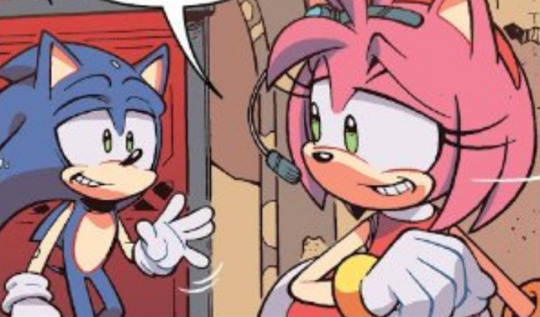
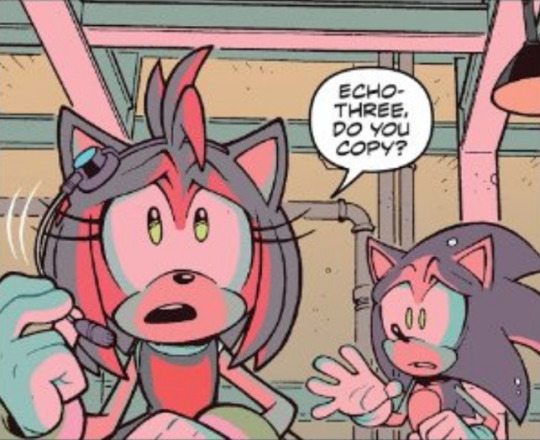
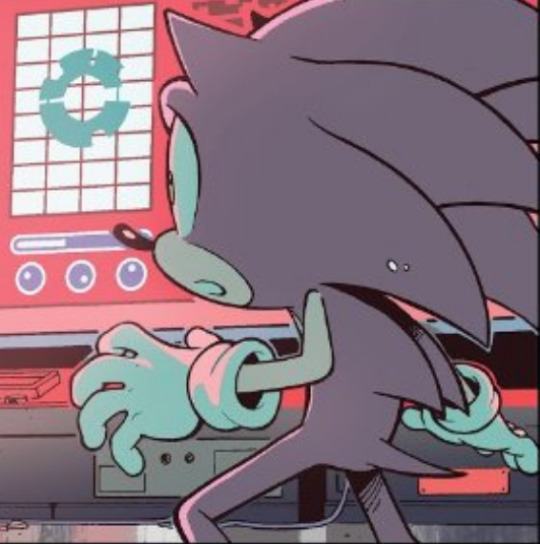

Well, in 2019, with the same accuracy of an aimbot, I said “We’ll probably see some new interactions between Sonic and Amy sometime around IDW #20”. And wouldn’t you know, as misery and tragedy settled in that arc, it was exactly around IDW #20 that we saw some Sonamy interactions: both exhausted, to their limit, with a Sonic that couldn’t even touch Amy to soothe her pain, due to him being infected with the virus.
The arc developed like this in what felt like an eternity, to finally conclude in one the most absurd ways in Sonic history. But it wasn’t a complete disappointment, as, after months and months of asking and discussing on the internet about how much Sonic and Amy deserved a hug at the end of the arc… it actually happened.
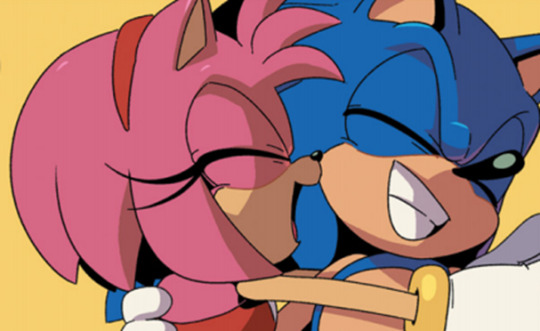
Since that moment in IDW #32, we shippers thought that it was what both of them deserved after so much time spent separated and pushed to their limit to survive, but also that after the end of the arc everything would go back to normal. However, what we didn’t know was that the Sonamy train had no intention of stopping, not in IDW, nor anywhere else.

A recurring detail in IDW Sonic is that Amy’s tail starts wagging every time she sees Sonic, as if she was a happy dog. I swear, it happens every time.
Come IDW #35, once again we have some hugs and bits of dialogue between our hedgehogs. For sure, the question here isn’t their relationship itself, as it was for IDW #2, but rather the issues this arc is slowly dealing with. But it’s really nice to see them again, sharing that closeness that they’ve had in the comic since the beginning– be it with some gestures of affection, a wink, a gesture, a private joke.


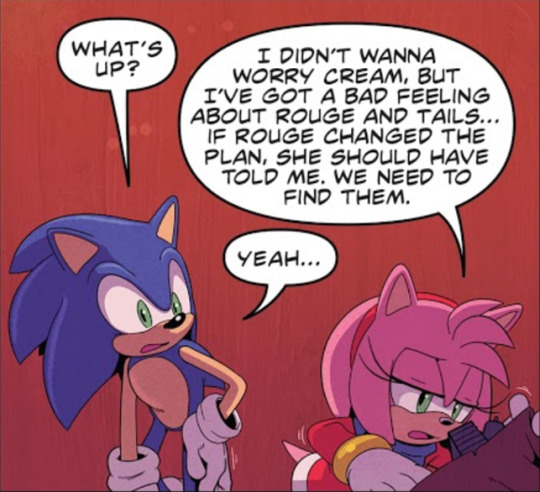

My favorite image is the first one, Belle’s reaction to seeing Amy hugging Sonic. It’s like she’s thinking “oh, is she his girlfriend?”, and she wouldn’t even be wrong in thinking that.
It can’t be denied that IDW Sonic provided us the conversations and the emotions that the games seldom do. Certainly, the comic has its share of issues and it’s not really a story that I personally follow for its own merits (it’s more because it’s still Sonic, for my interest for things like this, and Belle’s existence… whom I already ship with Tails, sorry not sorry), but what it does well it does really well.
For now, we have to see how IDW Sonic will follow the development of the characters, especially in view of the closure of the current story and beyond. And we may be done with this part of the article, but there is still a lot left.

Sonamy in merchandise
Taking us completely by surprise, recently SEGA launched, in collaboration with Hot Topic, a series of Sonamy-themed t-shirts. No, seriously.
So many people told me this as soon as the voice spread (you know who you are, thank you guys for thinking about me <3), and I can’t help being still surprised that this is actually a thing. T-shirts with lines like “You’re my favorite”, “Love in the fast lane”, and my personal favorite, “S&A Forever”, with drawings of Classic Sonic and Amy… in SEGA-approved products. I don’t know if you realize how much of a big deal this is, even more than “Celebrate the 25 years of Sonic’s girlfriend” from 2018.


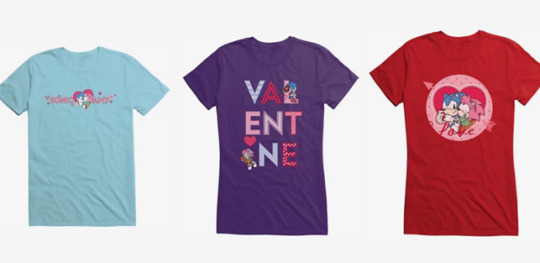
One of the things that surprised me the most (aside from how explicit they are in officializing the relationship, and the fact that there are still 2 months left before Valentine’s Day 2021), was the decision to use Classic Sonic and Classic Amy. I tried to understand this decision by analyzing the simplicity and easiness with which the Classic designs convey a message (let’s not forget that Classic Sonic was so iconic because it was specifically designed to convey his expressions without words), besides the fact that they’re inherently cuter than their modern designs. There’s also the controversial aspect of post-Adventure Sonamy, with all the dubbing and weird interpretations that the fandom made over the years… By comparison, the Classic design are a much simpler choice.
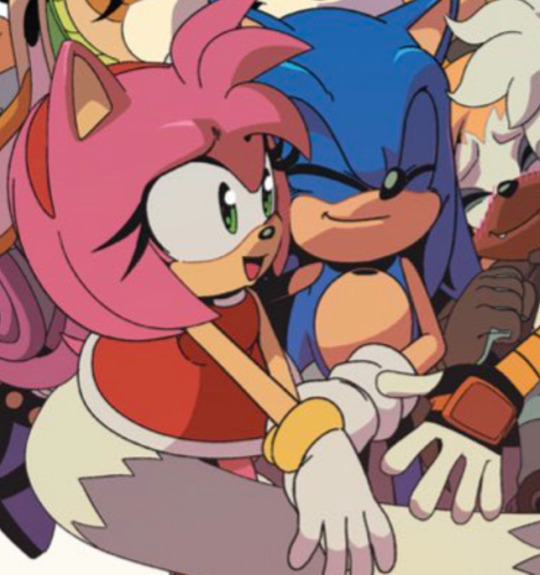
What is actually going on?
Well, let’s take a step back and think about what we just saw. The way SEGA has been recently trying to push Sonic and Amy in front view (and for the entirety of 2020, based on the articles I mentioned in the beginning) tells us the harsh truth we all have to accept sooner or later: Sonamy sells, and it sells a lot.
From a strictly business point of view, the ship is so iconic and popular, with fans and detractors alike, that it would be absurd for SEGA to ignore the chance to print these two characters and get a load of money. As I said in my 2018 article, despite the fact that in Japan Sonic isn’t as big of an icon as it is elsewhere, they know pretty well that Sonic + Amy = love, and they have huge amounts of merchandise to back it up. It’s in the West that because of different cultural values, of which we’ve already talked about, along with some internal resistance, left this aspect of the franchise a little on the side. But they’ve been trying to fix it… and how…
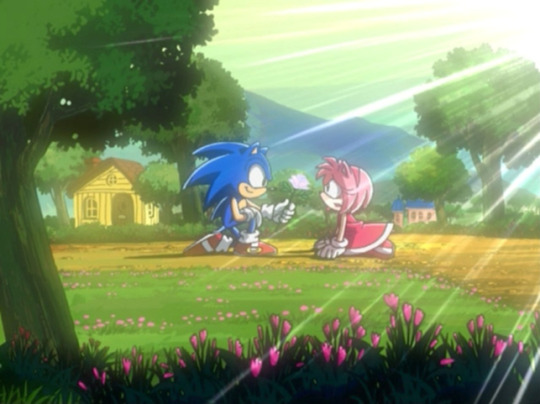
Let’s not forget that a decade and a half ago Sonic Team seriously favored Sonamy. They officially said it, Sonic X was their purest view of Sonic they had at the time.
Outside of the business perspective, I believe we’re facing the moment that we’ve been waiting for: it’s time they’ll establish once and for all the dynamic of these two characters, following more closely the original Japanese vision of Sonic. I said many times that, in trying to change canon, the West, especially SEGA of America, did nothing but confuse fans and generate more discussions than needed, by introducing different data and portrayals that contradict the canon established by Sonic Team.
We’ve talked about Unleashed and emotional support, about Sonic X, about the major moments that opened the door to interpreting this dynamic as something more. We don’t threaten at gunpoint those who would rather stay away, but we respond to those declarations that still try to violently discredit the simple fact that Sonic and Amy, who are most of all close friends, form in some measure a couple that, even with its imposed limitations, manages to captivate fans and not fans everywhere in the world. Even the Simpsons used it as a joke, and that says a lot.
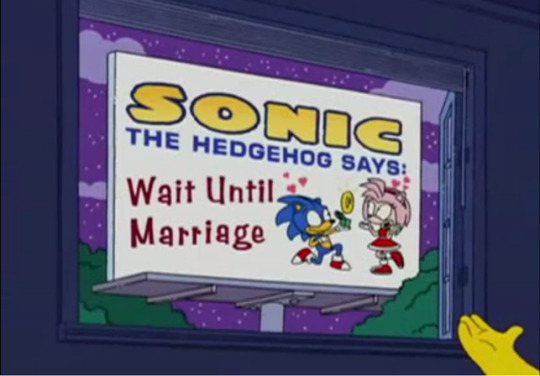
What the future has in store for us.
Unless something else happens in this last month of 2020, this is the most complete compilation I can offer at the moment about the status of Sonamy in the fandom and in the official canon. Yes, canon.
It’s impossible to ignore the signals. As you may have noticed, I’ve been considering Sonic and Amy as an official couple, with its clarifications (for example, that at the end it’s more of a friendship, that it’s not a romantic relationship in the most explicit way, that it’s more of a personal perspective to justify a more mature vision of the relationship in the future, not right now), but nowadays I think that SEGA has spoken loud and clear. I think canon is ready to negotiate the idea that Sonic and Amy, apart from being excellent friends who would risk their lives for each other in a heartbeat, have something else on their hands (probably the other’s hand). This won’t automatically translate into a kiss, or a complete love declaration (although Sonic X came close…), or a commitment to a formal relationship like we know them in real life. SEGA canon affirms that Amy is “Sonic’s girlfriend” and nothing more. Outside of that detail, they still pretty much function as friends interacting with a little flirting here, and a little Sonic running away there. It’s the basis of their dynamic, now enhanced by the fact that SEGA is giving us a clearer message.
I think that this all may culminate in a game or an animated series, but I wouldn’t completely count on that. It is good to recognize how far the official position goes on this issue, but at the same time I want to reaffirm that there are things that are better left in the hands of the fandom, and in the meantime that IDW or any other continuity gives us hugs, winks, gestures and words of encouragement, we as the fandom will take care of exploring other avenues and hypothetical scenarios.
This is all I have to say on the matter for now, and I hope you’re happy with this wonderful Sonamy experience we’re going through – I certainly am. See you next time!
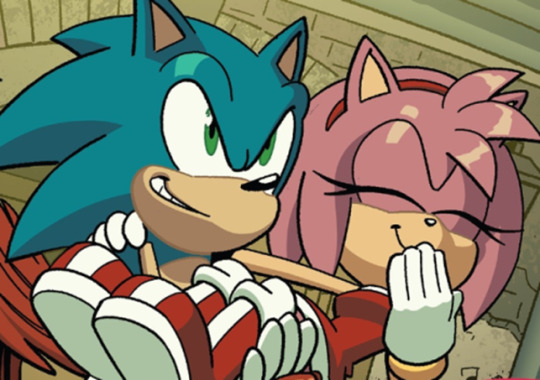
#sonic the hedgehog#sonamy#amy rose#translation#long post#whew#this one was a doozy#but super interesting#thanks again latin for writing these long ass sonamy posts
328 notes
·
View notes
Note
I feel like I've read a ton, but I'm honestly still pretty new to comics rn. That being said... What is one more day? Ik we don't like it and it happened a while ago, but that's about it [,=
Time for Spider-Man History With Traincat: Highly Controversial Storylines! And that feeling is totally normal with comics with huge canons -- you can read a ton and still have some fairly big blindspots in your understanding of the total picture. That being said, this is kind of a big one, both in terms of Spider-Man history/canon and in terms of how Spider-Man fandom functions. I would say probably no other storyline has had quite as much impact on how the fandom views and interacts with the source material as One More Day/Brand New Day. It's been the Wild West out here ever since it happened. (Which was in 2007, so like, yes, fairly long ago, especially when you look at how Spider-Man canon has evolved since, but in the grand scheme of things, also kind of recent. One More Day is not old enough to rent a car.)
So when people talk about Spider-Man's One More Day, they're usually actually talking about two related arcs: One More Day and Brand New Day. For the sake of simplicity, I'm going to be covering both. For the sake of transparency, I am going to admit that I think One More Day, as a self-contained story, is good, actually. This is controversial! I admit that! But I stand by my stupid opinions on this blog, for some reason. I think One More Day when you examine it on its own, by which I mean you ignore the decade and a half worth of canon that came after it, as a Spider-Man story and as a PeterMJ-centric story holds up under scrutiny and that people who don't like it don't like complicated love stories and might actually throw their own mothers under buses. No offense to the OMD haters. Little bit of offense to the OMD haters. Brand New Day, which is the continuation of One More Day, on the other hand -- largely bad. Very largely bad.
But let's backtrack. One More Day is a four issue crossover storyline that takes place directly after Civil War, during which Iron Man and Captain America got divorced and divvied up the superhero community and Spider-Man made some startlingly bad decisions and made a fugitive out of himself and his family in a manner that got Aunt May shot, and Spider-Man: Back in Black (Amazing Spider-Man #539–543) which examines Peter's actions immediately after Aunt May is shot and ends with him humiliating the Kingpin in front of an entire prison. One More Day consists of Amazing Spider-Man #544 -> Friendly Neighborhood Spider-Man #24 -> Sensational Spider-Man v2 #41 -> Amazing Spider-Man #545. In One More Day, Aunt May is dying, all of Peter's efforts to save her have thus far failed, and, consumed by guilt, he is rapidly running out of time. Approached by Mephisto, a literal demon from hell, Peter is offered a deal: Aunt May will live -- and Peter's identity, which was previously revealed to the world at large during Civil War, will once again be hidden from the memories of all but a select few -- if Peter trades him his marriage to Mary Jane. Peter and Mary Jane struggle with this, but eventually both agree to the deal. The clock strikes twelve, the deal is done, and Peter and Mary Jane's marriage fades into history.

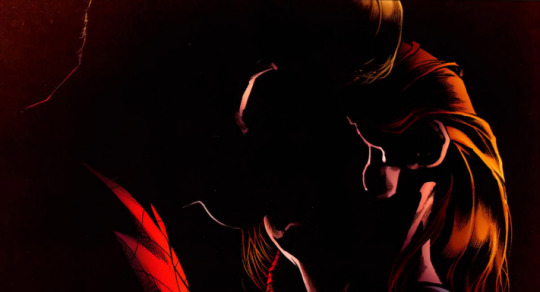

(ASM #545) A reasonably simple premise for a story that caused so many problems -- most, I would argue, not actually the original story's fault. So obviously, this was an unpopular move -- Peter and Mary Jane had for a long time been a fan favorite Marvel couple, and in a fictional universe where most relationships are doomed as soon as they begin, the enduring Spider-Marriage was sacred ground. And then, with a snap of its fingers, it was gone: Peter wakes up in Aunt May's house, no longer married, with Mary Jane out of the picture. (She would not return to the book on any sort of consistent basis for over 50 issues.) In the wake of One More Day began Brand New Day, which is basically what it sounds like: a promised "brand new day" of "exciting" Spider-Man content and a publishing schedule where Amazing Spider-Man came out three times a month. (Which sounds good on paper but I think in practice caused more problems than it created good storylines.) Peter, newly single again, had new love interests! And also Harry Osborn was alive again for some reason! I generally like Harry's post-BND stories so that part's fine with me.
But overall? Brand New Day is a mess. It knows it wants to tread new and exciting ground with Peter -- tell new stories! ensnare new readers! make them fork out for a book three times a month. -- but it doesn't know what those stories should be. Readers who were invested in Peter and Mary Jane's relationship -- a major facet of Spider-Man comics for decades at that point -- felt rightfully betrayed that the marriage could be so easily traded in and that Mary Jane herself, perhaps the second most important figure in Spider-Man comics after Peter, could be tossed aside. From a personal point of view, I think Brand New Day fails in large part because it abandons what has always made Spider-Man such a compelling series, and that's the mix of Peter's personal life with his vigilante life. BND sees Peter with new friends, new jobs, new love interests, etc -- it is very much a brand new day! But it isn't a better day compared to the stories that came before it. I do like some post-BND stories, especially American Son (ASM #595-599) and Grim Hunt (ASM #634-637), but compared to pre-BND where I think the majority of canon is good, it's a very lacking body of work that is hurt by the way it divorced itself from the PeterMJ marriage as Spider-Man's central relationship.
"But Traincat, I thought you said you liked One More Day?" Yeaaaaah. I do. This is why I keep saying I like One More Day on its own merits, and not on the merits of the stories it opened the doors for. I like a good romantic tragedy in fiction, and the way Peter and Mary Jane's final scene in One More Day plays out is beautiful. I like the idea of Peter caught in this impossible situation, being asked to choose between two women he loves more than his own life. A really common criticism I see leveled against One More Day is that Peter should have chosen his relationship with Mary Jane over May's life, which is -- okay, I think it's weird that people keep insisting on this, not in the least because by asking Peter to sacrifice his aunt's life they're essentially demanding he commit a callous, out of character act in order to further his own interests. It's also weird because the thing is, Peter already chose Mary Jane over May -- that's what gets them into this situation. It's literally in the scene where May is shot:
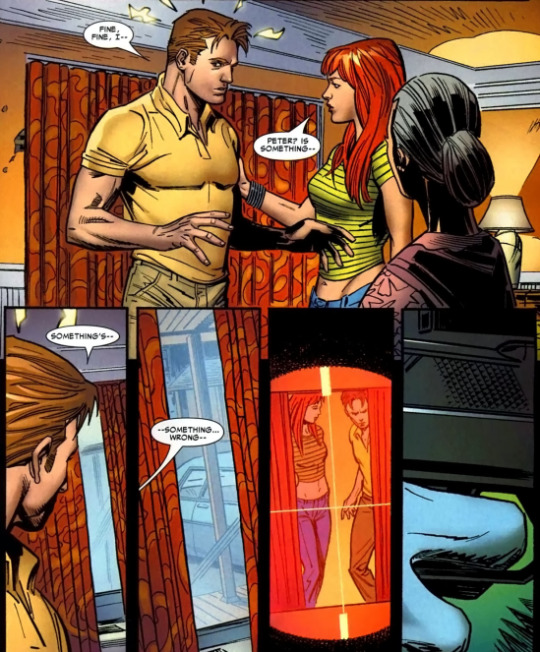

(ASM #538) When the gun goes off, Peter's spider-sense kicks in, and he covers Mary Jane, leaving May in the path of the bullet. He does choose Mary Jane over May, regardless of whether he realized what he was doing. And that's why he can't make that choice a second time. His actions in One More Day do make sense for him as a character, whether or not any individual reader likes them, and Mary Jane's actions make sense, too -- after all, she's the one who ultimately tells Mephisto that they agree to the deal when Peter can't bring himself to voice it.
A lot of people also like to nitpick One More Day by going, well, why could (x) or (y) with life saving powers save Aunt May which is like -- yeah, I guess, but if we're going to ask that about this specific comic book near death setup, you kind of have to do it with every single one, and I'm not going to stake every single moment of comic book drama on whether or not that gold kid from the X-Men was busy at the time. Comics are soap operas in flimsy paper form: serialized longform storytelling that relies heavily on melodrama. Sometimes you have to go with things. Sometimes you sell your marriage to the devil. Stuff happens. That in and of itself doesn't make One More Day a bad story -- and while some people blame the Spider-Marriage's dissolution entirely on One More Day, I think that's a little shortsighted when you look at the history of Spider-Man since the turn of the century. It's clear -- and Marvel themselves have been perhaps a little too open about this -- that Marvel in the past few decades has had trouble with the direction they want to take Spider-Man. They WANTED Spider-Man to appeal to a distinctly youthful audience that they didn't think they were actually reaching -- understandable, considering that Marvel nearly went bankrupt around 2000 and was saved by Ultimate Spider-Man, an out of main continuity series which retold Spider-Man from the beginning and focused heavily on Peter as a teen -- but the problem was Spider-Man in the main continuity was at that point in canon a happily married man who was pushing the dreaded 30 whether or not they wanted to admit that. This is also why Marvel has continually pivoted away from Spider-Man having kids, because they feared that making him a dad would age him too much and make him unrelatable to their coveted audience of Teens. (This is also why almost every new Spider-Man property, especially the live action movies, perpetually stick him back into high school, despite that occupying a very small slice of 616 canon.) So around the year 2000, they started trying things in relation to the Spider-Marriage, which was viewed as a major problem -- after all, what's more adult than being married and liking your wife. First, they had Mary Jane presumed dead. Then, they had Mary Jane and Peter separate. Then, when Mary Jane and Peter had only recently gotten back together, One More Day struck. If One More Day specifically hadn't gone the way it had, it's pretty clear that the Spider-Marriage was going to go one way or another -- it's a little bit of a shame it happened when it did, because OMD is the end of J Michael Straczynski's run, and JMS wrote a really beautiful Peter and MJ relationship. But Marvel as a company and especially editor in chief at the time Joe Quesada viewed Peter and Mary Jane's relationship as a major problem in how they wanted to portray Spider-Man and thought that striking the relationship from the books would allow them more freedom in their portrayal of him as younger and more relatable to their Desired Audience of people who I guess really wanted to see Peter sleep with characters who weren't Mary Jane.
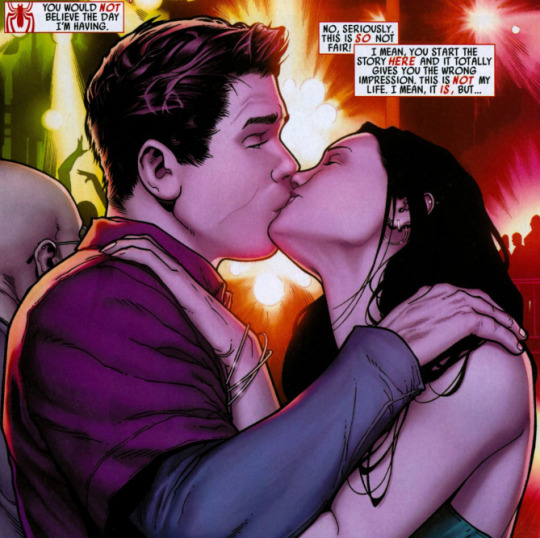
(ASM #546. Younger! Fresher! Less attached! Kissing random women in the club!)
The problem with One More Day has always been in the follow through -- from the content of Brand New Day to the pacing of events to the fact that Marvel withheld key information for such a long time that it allowed misinformation to thrive. After all, what does it MEAN to trade Peter and Mary Jane's marriage to the devil? It altered the events of canon in Peter and the majority of other characters' memories so that the marriage didn't exist, but it left people wondering -- did the relationship as they remembered it existed? How much of Spider-Man canon was altered? And the answers didn't come for over 100 issues of Amazing Spider-Man. One Moment In Time or OMIT (Amazing Spider-Man #638-641), which revealed that while Peter and Mary Jane never got married in the altered canon they did continue their long committed relationship up until just after Civil War, was published in 2010, so essentially readers were hung out to dry without answers for three years. That's a long time to string people along, but not as long as it took Marvel to confirm that the popular fan theory that Mary Jane retained her memories of the original timeline as part of her own deal with Mephisto was also true, which happened this year. I would say, at least from my perspective, a lot of the frustration doesn't come from the individual One More Day storyline so much as how Marvel has continually dragged out the aftermath, using the promise of a Spider-Marriage return to keep fans on the hook. Which is why One More Day continually comes up in discussion of current Spider-Man, because Spencer's run has relied very heavily on imagery from that period with a serious question of whether or not there actually was going to be payoff, something which is still up in the air.
This has been Spider-Man History With Traincat, brought to you by anonymice like you.
60 notes
·
View notes
Text
Life is Strange: True Colors
Leading up to the release of Episode 1 of TellTale's The Walking Dead game, I was working freelance for GameRevolution at the time, lived in the area, and had the chance to play a build of the game to write a preview on it. I remember comparing it to Mass Effect because, at the time, there just...weren't games of that subgenre. Of course, by now we've seen an explosion of this type of game - the 'narrative/choice-driven game,' spearheaded and even oversaturated by Telltale to their own demise.
Out of all of the games that have come from that initial boom, Life is Strange by DontNod was and still is the most influential on my life, but I also have always harbored really conflicted feelings about it - especially with how it resolved its narrative. Hell, if you're reading this, you're probably aware that I spent a few years of my life creating a sequel fanstory which I even adapted a chunk of into visual novel format. Hundreds of thousands of words, days and days of life spent essentially trying to process and reconcile my conflicted feelings about this game's conclusion(s). Since then, I've been experimenting with interactive fiction and am currently developing my own original visual novel using everything I've learned from both creating and playing games in this genre. It's a subgenre of game I have a lot of interest and passion for because, when handled well, it can allow a player to sort of co-direct a guided narrative experience in a way that's unique compared to strictly linear cinematic experiences but still have a curated, focused sense of story.
Up until this point, I've regarded Night in the Woods as probably the singular best game of this style, with others like Oxenfree and The Wolf Among Us as other high marks. I've never actually put any Life is Strange game quite up there - none of them have reached that benchmark for me, personally. Until now, anyway.
But now, I can finally add a new game to that top tier, cream of the crop list. Life is Strange: True Colors is just damn good. I'm an incredibly critical person as it is - and that critique usually comes from a place of love - so you can imagine this series has been really hard to for me given that I love it, and yet have never truly loved any actual full entry in it. I have so many personal issues, quibbles, qualms, and frustration with Life is Strange: with every individual game, with how it has been handled by its publisher (my biggest issue at this point, actually), with how it has seemingly been taken away from its original development studio, with how it chooses to resolve its narratives...
But with True Colors, all of those issues get brushed aside long enough for me to appreciate just how fucking well designed it is for this style of game. I can appreciate how the development team, while still clearly being 'indie' compared to other dev teams working under Square-Enix, were able to make such smart decisions in how to design and execute this game. Taken on its own merits, apart from its branding, True Colors is absolutely worth playing if you enjoy these 'telltale' style games. Compared to the rest of the series, I would argue it's the best one so far, easily. I had a lot of misgivings and doubts going in, and in retrospect, those are mostly Square-Enix's fault. Deck Nine, when given the freedom to make their own original game in the same vein as the previous three, fucking nailed it as much as I feel like they could, given the kinds of limitations I presume they were working within.
I'm someone who agonizes every single time there is news for Life is Strange as a series - someone who essentially had to drop out of the fandom over infighting, then dropped out of even being exposed to the official social media channels for it later on (I specifically have the Square-Enix controlled channels muted). I adore Max and Chloe, and as a duo, as a couple, they are one of my top favorites not just in gaming, but in general. They elevated the original game to be something more than the sum of its parts for me. And while I have enjoyed seeing what DontNod has made since, it's always been their attention to detail in environmental craftsmanship, in tone and atmosphere, which has caught my interest. They're good at creating characters with layers, but imo they've never nailed a narrative arc. They've never really hit that sweet spot that makes a story truly resonate with me. Deck Nine's previous outing, Before the Storm, was all over the place, trying to mimic DontNod while trying to do its own things - trying to dig deeper into concepts DontNod deliberately left open for interpretation while also being limited in what it could do as a prequel.
But with True Colors, those awkward shackles are (mostly) off. They have told their own original story, keeping in tone and concept with previous Life is Strange games, and yet this also feels distinctly different in other ways.
Yes, protagonist Alex Chen is older than previous characters, and most of the characters in True Colors are young adults, as opposed to teenagers. Yes, she has a supernatural ability. And yes, the game is essentially a linear story with some freedom in how much to poke around at the environment and interact with objects/characters, with the primary mechanic being making choices which influence elements of how the story plays out. None of this is new to the genre, or even Life is Strange. But the execution was clearly planned out, focused, and designed with more caution and care than games like this typically get.
A smaller dev team working with a budget has to make calls on how to allocate that budget. With True Colors, you will experience much fewer locales and environments than you will in Life is Strange 2. Fewer locations than even Life is Strange 1, by my count. But this reinforces the game's theming. I suspect the biggest hit to the game's budget was investing in its voice acting (nothing new for this series) but specifically in the motion capture and facial animation.
You have a game about a protagonist trying to fit in to a small, tightly knit community. She can read the aura of people's emotions and even read their minds a little. And the game's budget and design take full advantage of this. You spend your time in a small main street/park area, a handful of indoor shops, your single room apartment. It fits within a tighter budget, but it reinforces the themes the game is going for. Your interactions with characters are heightened with subtle facial cues and microexpressions, which also reinforces the mechanic and theming regarding reading, accepting, and processing emotions. And you get to make some choices that influence elements of this - influenced by the town, influenced by the emotions of those around you, which reinforce the main plot of trying to navigate a new life in a small town community.
When I think about these types of games, the conclusion is always a big deal. In a way, it shouldn't be, because I usually feel it's about the journey, not the destination. And as an example, I actually really dislike the ending of the original Life is Strange. I think it's a lot of bullshit in many ways. The setpiece is amazing and epic, sure, but the actual storytelling going on is...really hollow for me. Yes, the game does subtly foreshadow in a number of ways that this is the big choice it's leading up to, but the game never actually makes sense of it. And the problem is, if your experience is going to end on a big ol' THIS or THAT kind of moment, it needs to make sense or the whole thing will fall apart as soon as the credits are rolling and the audience spends a moment to think about what just happened. When you look at the end of Season 1 of Telltale's The Walking Dead, it's not powerful just because of what choice you're given, but because through the entire final episode, we know the stakes - we know what is going to ultimately happen, and we know the end of the story is fast approaching. All of the cards are on the table by the time we get to that final scene, and it works so well because we know why it's happening, and it is an appropriate thematic climax that embodies the theming of the entire season. It works mechanically, narratively, and thematically, and 'just makes sense.'
The ending of Life is Strange 1 doesn't do that, if you ask me. The ending of most games in this genre don't really hit that mark. When I get to the end of most game 'seasons' like this, even ones I enjoy, I'm typically left frustrated, confused, and empty in a way.
The ending of True Colors, on the other hand, nails everything it needs to. Handily, when compared to its peers.
If you're somehow reading this and have not played this game but intend to, now is probably where you should duck out, as I will be
discussing SPOILERS from the entire game, specifically the finale.
.
.
.
.
.
.
.
Firstly, since I don't know where else to put this, some criticisms I found with the game. And honestly, they're all pretty damn minor compared to most games of this type.
Mainly, I just wish the whole Typhon thing was handled a bit more deliberately. It's a bit weird to do the 'big evil corporation' thing (especially when a big corporation like Square Enix occupies as much as or even more of the credits to this game than the people who actually MADE it?) without offering more explanation and subtlety. The game certainly makes some efforts but they're mostly small and mostly optional, like background chatter or a handful of one-off bits of documentation/etc. you can find in the environment. I feel like Diane in particular needed to be fleshed out just a little bit more to really sell us on how and why things like this happen, why corporations make decisions that cost people their happiness, security, and lives and they just get to keep on doing it. I think just a little bit that is unavoidable to the player that puts emphasis on maybe how much the town relies on the money/resources Typhon provides would've helped. Again, this is minor, but it stands out when I have so little else to critique.
I would've liked to get more insight on why Jed is the way he is. No, I don't think we really needed to learn more about his backstory, or even really his motivations. I think we get enough of that. I just think it would've been great to somehow highlight more deliberately how/why he's built up this identity overtop of what he's trying to suppress. Maybe even just having Alex internally realize, "Wait, what the hell, Jed has been hiding these emotions and my powers haven't picked up on it?" or something to that effect could have added an extra oomph to highlight how Jed seems to be coping with his emotions by masking/suppressing them. Also really minor complaint, but again...there's not much else here I can think to really improve on within the confines of what's in the game.
The game doesn't really call Alex's power into question morally. Like. Max has an entire meltdown by the end of her story, second-guessing if she's even helped anyone at all, if she has 'the right' to do so, how her powers might be affecting or expressing her own humanity and flaws...this story doesn't really get into that despite a very similar concept of manipulating others. There's like one bit in a document you can choose to read in Alex's 'nightmare' scene, but that's really it. I feel like this sentiment and how it's executed could have easily been expanded upon in just this one scene to capture what made that Max/Other Max scene do what it did in a way that would address the moral grayness of Alex's powers and how she uses them, and give players a way to express their interpretation of that. Also, very small deal, just another tidbit I would've liked to see.
When I first watched my wife play through Episode 5 (I watched her play through the game first, then I played it myself), I wasn't really feeling the surreal dreamscape stuff of Alex's flashbacks - which is weird, because if you're read my work from the past few years, you'll know I usually love that sort of shit. I think what was throwing me off was that it didn't really feel like it was tying together what the game was about up until that point, and felt almost like it was just copying what Life is Strange did with Max's nightmare sequence (minus the best part of that sequence, imo, where Max literally talks to herself).
But by the time I had seen the rest of the story, and re-experienced it myself, I think it clicked better. This is primarily a story about Alex Chen trying to build a new life for herself in a new community - a small town, a tightly knit place. Those flashbacks are specifically about Alex's past, something we only get teeny tiny tidbits of, and only really if we go looking for them. I realized after I gave myself a few days to process and play through the game myself that this was still a fantastic choice because it reinforces the plot reasons why Alex is even in the town she's in (because her father went there, and her brother in turn went there looking for him), and it reinforces the theme of Alex coming to accept her own emotions and confront them (as expressed through how the flashbacks are played out and the discussions she has with the image of Gabe in her mind, which is really just...another part of herself trying to get her to process things).
By the time Alex escapes the mines and returns to the Black Lantern, all of the cards are on the table. By that point, we as the audience know everything we need to. Everything makes sense - aside from arguably why Jed has done what he has done, but put a pin in that for a sec. We may not know why Alex has the powers she does, but we have at least been given context for how they manifested - as a coping mechanism of living a life inbetween the cracks of society, an unstable youth after her family fell apart around her (and oof, trust me, I can relate with this in some degree, though not in exactly the same ways). And unlike Max's Rewind power, the story and plot doesn't put this to Alex's throat, like it's all on her to make some big choice because she is the way she is, or like she's done something wrong by pursuing what she cares about (in this case, the truth, closure, and understanding).
When Alex confronts Jed in front of all of the primary supporting characters, it does everything it needs to.
Mechanically: it gives players choices for how to express their interpretation of events, and how Alex is processing them; it also, even more importantly, uses the 'council' as a way of expressing how the other characters have reacted to the choices the player has made throughout the game, and contributes to how this climax feels. We're given a 'big choice' at the end of the interaction that doesn't actually change the plot, or even the scene, really (it just affects like one line of dialogue Alex says right then) and yet BOTH choices work so well as a conclusion, it's literally up to your interpretation and it gives you an in-game way to express that.
Thematically: the use of the council reinforces the game's focus on community; and the way the presentation of the scene stays locked in on Alex and Jed's expressions reinforces its focus on emotion - not to mention that the entire scene also acts as a way to showcase how Alex has come to accept, understand, and process her own emotions while Jed, even THEN, right fucking at the moment of his demise, is trying to mask his emotions, to hide them and suppress them and forget them (something the game has already expressed subtly by way of his negative emotions which would give him away NOT being visible to Alex even despite her power).
Narratively: we are given a confrontation that makes sense and feels edifying to see play out after everything we've experienced and learned. We see Alex use her powers in a new and exciting way that further builds the empowering mood the climax is going for and adds a cinematic drama to it. No matter what decisions the player makes, Alex has agency in her own climax, we experience her making a decision, using her power, asserting herself now that she has gone through the growth this narrative has put her through. Alex gets to resolve her shit, gets to have her moment to really shine and experience the end of a character arc in this narrative.
Without taking extra time to design the game around these pillars, the finale wouldn't be so strong. If they didn't give us enough opportunities to interact with the townspeople, their presence in the end wouldn't matter, but everyone who has a say in the council is someone we get an entire scene (at least one) dedicated to interacting with them and their emotions. If they didn't implement choices in the scene itself, it would still be powerful but we wouldn't feel as involved, it'd be more passive. If they didn't showcase Alex's power, we might be left underwhelmed, but they do so in a way that actually works in the context through how they have chosen to present it, while also just tonally heightening the climax by having this drastic lighting going on. If they didn't have the council involved, we'd lose the theming of community. If they didn't have the foil of Alex/Jed and how they have each processed their emotions, we'd miss that key component. And if we didn't have such detailed facial animations, the presentation just wouldn't be as effective.
Ryan/Steph are a little bit like, in this awkward sideline spot during the climax? Steph always supports you, and Ryan supports you or doubts you conditionally, which is unsurprising but also ties into the themes of Ryan having grown up woven into this community, and Steph being once an outsider who has found a place within it. They're still there, either way, which is important. The only relevant characters who aren't present are more supporting characters like Riley, Ethan, and Mac. Ethan being the only one of those who gets an entire 'super emotions' scene, but that also marks the end of his arc and role in the story, so...it's fine. Mac and Riley are less important and younger, as well, and have their own side story stuff you have more direct influence on, too.
But damn, ya'll, this climax just works so well. It especially stands out to me given just how rarely I experience a conclusion/climax that feels this rewarding.
And then after that we get a wonderful montage of a theoretical life Alex might live on to experience. Her actions don't overthrow a conglomerate billionaire company. She doesn't even save a town, really. If the entire council thinks you're full of shit, Jed still confesses either way - because it's not up to the council whether he does this, it's because of Alex, regardless of player choice. Honestly, even after a playthrough where I made most choices differently from my wife, there weren't really many changes to that montage at the end. It'd have been great if it felt more meaningfully different, but maybe it can be. Even if not, the design intent is there and the execution still works. It's a really nice way to end the story, especially since it's not even a literal montage but one Alex imagines - again, her processing what she's gone through, what she desires, expressed externally for us to see it.
And for once, the actual final 'big decision' in a game of this type manages to be organic, make sense, and feel good and appropriate either way. You choose to either have Alex stay in Haven Springs and continue building her life there, or you can choose to have her leave and try to be an indie musician, with the events of the game being yet another chunk of her life to deal with and move on from (I haven't really touched on it, but music, especially as a way to express and process emotions, is a recurring thing, much like photography was in the original game, or Sean's illustrations in LiS2). For once, a climactic 'pick your ending' decision that doesn't feel shitty. It's pretty rare for this genre, honestly.
I could - and already have, and likely will - have so much more to say about this game and its details, but I really wanted to focus on touching upon a main element that has left me impressed: the way the entire game feels designed. It feels intentionally constructed but in a way that reinforces what it is trying to express as a story. It's not just trying to make people cry for the sake of 'emotions.' It is a game literally about emotions and it comes to a conclusion in a way that is clearly saying something positive and empowering about empathy and self-acceptance.
Storytelling is a craft, like any other, and it entails deliberate choices and decisions that can objectively contribute to how effective a story is for its intended audience.
A good story isn't something you find, after all.
It's something you build.
18 notes
·
View notes
Text
MY ALL TIME FAVORITE ANIME
In honor of two years of Anime Updates, I’ve reconstructed my now Top 30 favorite anime series’ of all time, and I also have a slew of honorable mentions for anime I also really enjoy and value dearly.
1. Dragon Ball Z Kai (The definitive distillation of everything that was great about the DBZ manga and all that’s great about DBZ in anime.)
2. Digimon Adventure (1999) (An absolute classic of children’s anime that has enough depth and maturity to appeal to its fans years later)
3. Pokemon: The Beginning (It may be cliché to say something in Pokemon was at its best in Gen 1 but...the anime absolutely was.)
4. Neon Genesis Evangelion (Some anime ascend even masterpiece status and become bonafide legends. This is one of the best ones.)
5. Cowboy Bebop (See what I just said above. It applies here too.)
6. Yu Yu Hakusho (Not only a Shonen masterwork, but one where the anime is actually an improvement upon the original manga!)
7. Assassination Classroom (Basically the Yu Yu Hakusho of the 2010s, and bar none director Seiji Kishi’s most astonishing work.)
8. Yu-Gi-Oh! / Yu-Gi-Oh! Duel Monsters (While the latter faltered more compared to the former, both have undeniable merits.)
9. Sailor Moon / Sailor Moon R (Again, see what I just said above.)
10. The Slayers / Slayers NEXT (This may not have really gone anywhere as a franchise, but I’ll always have a soft spot for it.)
11. Anohana: The Flower We Saw That Day (In only 11 episodes, it tells a captivating and heartrending story that really sticks with you.)
12. Digimon Tamers (Objectively the strongest and smartest written of the Digimon series. It’s like a Digi-Evangelion - what’s not to love?)
13. Star Driver: Takuto of the Radiance (It’s just so - much - FUN. Criminally underrated, but it really was exceptional at what it did.)
14. Love Live! School Idol Project / Love Live! Sunshine!! (The latter more so than the former, but both of them just really delight me.)
15. El Hazard / The Wanderers (While I love the original OVA, I love the TV series version derived from it just as much in its own way)
16. The Melancholy of Haruhi Suzumiya (2006) (Madcap chaos and a surprising amount of heart and depth from start to finish.)
17. Digimon Adventure 02 (Yeah, it’s a mess and it fails as a sequel to its predecessor, but it’s heart was always in the right place.)
18. FullMetal Alchemist: Brotherhood (One of the most awe-inspiring and epic achievements of Japanese media, especially for Shonen!)
19. Puella Magi Madoka Magica (I enjoy a lot of what comes out of this franchise, but the original 12 episode story is forever the best.)
20. A Place Further Than The Universe (Who knew a short show about girls on a trip to Antarctica could end up so fucking good?)
21. Pokemon: Sun and Moon (The strongest single series that the Pokemon anime has ever done, with a great cast and stories.)
22. When They Cry: Higurashi (No horror anime can quite compare to this one. Note that this covers Kai & Rei too, but nothing else.)
23. Mobile Fighter G Gundam (The Gundam franchise is diverse and varied, yet no series in it could ever match this one in my heart!)
24. Vinland Saga (A work of historical fiction that is truly epic and compelling on a massive scale that few anime dare attempt.)
25. Excel Saga (In total contrast with the above Saga, this one is just balls-to-the-walls goofy and insane, and I love every second of it!)
26. Death Note (The manga and the film duology do it better, but there’s still much to be enjoyed in the anime adaptation as well.)
27. Pokemon: Best Wishes (The series that’s most to credit with rejuvenating a stale anime property. Shame 'bout that final year, tho.)
28. Nadja of Tomorrow (It’s like a classical, old fashioned novel played out across 50 episodes of anime, and a ride I enjoy a lot.)
29. Hellsing Ultimate (The sole contender to Higurashi in terms of being a superbly done dark and gory horror anime.)
30. Code Geass: Lelouch of the Rebellion (The Code Geass franchise could never do anime better than in this initial outing.)
Honorable Mentions: Ace Attorney: The Animation, Angel Beats!, Bakugan: Battle Brawlers, Berserk, Black Lagoon, Carole & Tuesday Cours 1, CLANNAD / After Story, Danganronpa: The Animation, Digimon Fusion, Don’t Toy With Me, Miss Nagatoro, Dragon Ball / Dragon Ball Z, Eureka Seven, Fruits Basket (2019), Gintama, InuYasha, Kill La Kill, Little Witch Academia, Love, Chunibyo & Other Delusions, March Comes In Like A Lion, Magic Knight Rayearth, Monster, My Bride Is A Mermaid, My Hero Academia, My-HiME / My-Otome, Nisekoi: Fake Love, One Piece, Pokemon Journeys, Re:Zero, Revolutionary Girl Utena, Rurouni Kenshin, Sailor Moon Crystal: Infinity, School Live!, Shaman King, SSSS Gridman, Tengen Tonpa Gurren Lagann, Tenchi Muyo, The Future Diary, The Promised Neverland S1, Toradora, Wolf’s Rain, and Zatch Bell.
20 notes
·
View notes
Text
Top 5 Novels: or it gets dark around here early.
So now I am trying to say something. That is all. No, that will not do at all... Here is a list of my top 5 novels, with one short review and four long ones.
1, Jim Dodge - Stone Junction.
Reading Stone Junction by Jim Dodge is like meeting the father you never had
2, Thomas Pynchon - Gravity's Rainbow
Subtlety is overrated... and just because you have a boner doesn't mean you're a terrorist. I mean, it doesn't mean you're not causing those rockets to come from the sky. But, still, that is beside the point.
For me, this book is about obliterating the arbitrary distinction between high and low culture. The ironically arbitrary distinction between good and evil and the dangerously subtle distinction between despondency and hope.
Fractured, layered, elusive, you could accuse Pynchon of all these things.
The way characters bleed into one another to make one voice. A hellish symphony of discordant cries of pain reaching out to a belief that there is a light at the end of the tunnel and paranoia is the glue.
Also, it is funny. Like in a dumb way and there are songs. Also, dumb.
Everyone will talk about how polarising this book is but I don't believe it. you can follow the bouncing ball and sing along or live in fear that at any moment the terror will become real and you will collapse into ellipsis...
It is the third and newer testament. An epilogue to western culture as racist cultural energy written by a crazy white guy. T.S. Elliot and his wasteland were a prelude, in hindsight, nothing but a john the baptist-like figure for the cross that Pynchon presents to all readers as their burden to carry with this book.
Hope is crazy painful, consciousness is such a fragile thing and the burden of consciousness is the pain of knowing that (beyond the act of effort itself) it is a futile one.
Jim Dodge once said, "a stone falls till it hits the earth, transcend what?" and that about sums it up.
3, Cormac McCarthy - Blood Meridian.
Blood Meridian is a kind of repetitious, primeval-hillbilly level of primitive interpretation of the morality expressed in the book of revelation fighting its way onto the page as barely literate poetry.
It is not a book of social niceties, justice, or the warm feeling you get when you do something good. also, this book could also easily be seen as porn for serial killers.
I scanned the reviews and saw all the campy (and not the good kind of campy) parodies this kind of book inspires in the age of irony we live in (though it seems like it is on its last legs). And while I like me a good parody, I find that Eli Cash did it better.
There is something to be said about how Cormac McCarthy (ab)uses the English language. The one good line I read from one of the negative reviews of his books was that a middle schooler could list what he doesn't like about the kids who bully him and that this list would have more emotional nuance and better use of punctuation than a Cormac McCarthy novel. This is fair.
The conceptional power of Blood Meridian though is that it frames cruelty and violence for what it is: reality. While also through its sometimes monotonous exaggeration of William Faulkners styled repetitions it creates a sense of unreality. A sense that like David Lynch's best work that we are walking, daily, through something so evil and violent that it borders on slapstick, and at last we laugh in self-defense.
I think the people who parody the book without much thought got trapt in the intellectual self-defense state that is part of coping and couldn't see the forest for the trees.
Civilization is a fragile thing, it is the human race trying to domesticate itself, and the longer it goes on the more it seems like we're just sweeping what we don't like under the rug.
4, John Crowley - Little, Big.
There is a kind of hokey-Americana style kitsch that most of my favorite writers could be accused of, from, Tom Robbins to Jim Dodge. John Crowley may be the peak of it. It could be because on the surface Americans don't have a unified culture we are a melting pot with capitalism only encouraging the lowest common denominator (the pursuit of greed as its own reward).
But in any creative act that does not presume to be the literal expression of anything but pure gratitude, there is politics. The politics of worth, of greatness, inherent value, and the desire to prove that the wisdom offered was truly earned. That a difficult pleasure does not mean that there is none.
This is an American fairytale. A once upon a time that seems eerily to remind of another Crowley, that codesigned the deck of Thoth tarot cards (A really good one for those curious) more than the writers of magical realism. And probably because I didn't read this in translation I preferred it to a hundred years of solitude. This may seem random to people of the fantasy crowd who know that genre is only a limitation to artistic merit if you want it to be (usually for cultural-political reasons). but people often compare this book to Gabriel Garcia Marquez's writing. And while they are both family chronicles with supernatural elements. this is kind of a shallow comparison.
Crowley's work is more in the tradition of an occult mystic, and Gabo is more a romantic using personal folklore as the vocabulary of that romantic expression (of which I think love in the time of cholera, is his masterpiece).
I am trying to not give away any spoilers, or even talk about specifics at all. but the ending is worth it. Like most things in life, it's your journey to go on so I won't ruin it for you, but they are out there waiting for you, where the lights never go out.
5, Neil Gaiman - The Ocean at the End of the Lane.
"words save our live's sometimes"
I was a frustrated borderline feral child, who could not deal with reality. My parents taught me how to read and not much else. I was homeschooled and weighed three hundred pounds by the time I was thirteen. I remember one night unable to deal with any more abuse that I laid down and decided my dreams would have to be enough, I close my eyes and went away for a long time. Lettie Hempstock's ocean is real to me I almost drowned in it.
When I was a teenager the cult-like fundamentalist atmosphere of my home life became less extreme, but the damage was done. I was still in the ocean. it says something about my state of mind that the closest I came to getting traction on reality was starting a habit of reading insistently, my favorite book was Stardust by Neil Gaiman.
Once on Twitter, I told him "thank you" for writing it. I later after reading this book I wrote a short review of this book and sent it to him. He said "thank you" to me in a @ mention. It was nice. I later @ mentioned him in a playfully sarcastic way and he deleted his original comment.
I was diagnosed with paranoid schizophrenia when I was twenty-four or twenty-five. I have been told I had childhood-onset schizophrenia. I have been told I milk it. I have been told that I self isolate.
I have been writing reviews tonight, going through my favorite books, and just live streaming my mind. Thinking about how they made me feel and what they make me think. Neil Gaiman's work always makes my brain retreat on itself. Possibly because of stardust. But more than that it is the wisdom he has. He knows that stories are true in a way that transcends a mere list of facts. communicating for those with an ear to listen that there is more than what we know, there is more than our understanding, there is more than us. More than you, more than me. There is an ocean that is healing for some while necessarily absent for others.
We forget, and we remember. Each other and ourselves. Cruelty and innocence. But there is an ocean and it is Lettie Hempstock's.
#literature#gothic literature#top 5 anything#top 5 list#top five novels#top 5 novels#fiction#literary criticism#literary critique#fantasy#scififantasy#western#postmodern#thomas pynchon#john crowley#neil gaiman#jim dodge#cormac mccarthy
24 notes
·
View notes
Text
Anime Recommendations
Here is a list of ten anime (in no particular order) that are definitely worth watching, yet don’t seem to get nearly as much recognition as they deserve.
Terror in Resonance (2014)
This is my personal favorite anime and I push people to watch it whenever I can, which is exactly what I’m doing here.
This show is set-in present-day Tokyo, which has been decimated by a terrorist attack, and the only hint to the identities of the culprits is a bizarre video uploaded on the internet. For the majority of the show the plot follows two different narratives: those of the investigators tasked with bringing down the terrorists, and of the terrorists themselves.
My Rating: 10/10
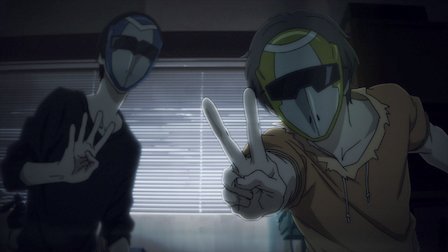
Toilet-Bound Hanako-Kun (2020)
This anime is probably one of my favorites, if not my number one, in terms of art style. I love everything about the character designs and the colors used. It is just so soothing to look at.
The famous "Seven Wonders" that every school seems to have are a staple of Japanese urban legends. One of the most well-known of these tales is that of Hanako-san:
Rumors claim that if one successfully manages to summon Hanako-san, the ghost of a young girl who haunts the school's bathrooms, she will grant her summoner any wish. When Nene Yashiro, a girl hoping for romantic fortune, dares to summon Hanako-san, she discovers that the rumored "girl" is actually a boy!
After a series of unfortunate events involving Nene's romantic desires, she is unwillingly entangled in the world of the supernatural, becoming Hanako-kun's assistant. Soon, she finds out about Hanako-kun's lesser-known duty: maintaining the fragile balance between mortals and apparitions.
My Rating: 8/10
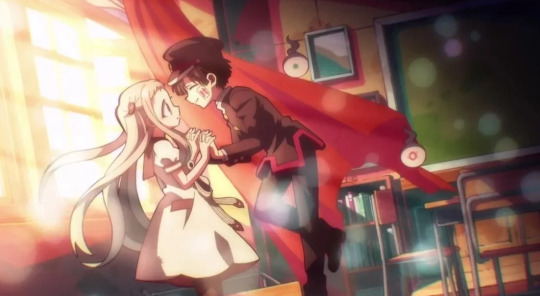
Kids on the Slope (2012)
If you love jazz, or history, or even heartwarming tales of friendship then this is the show for you. I will admit that is has a bit of a slow start, but by the time you get to the end you’ll be wishing for more.
In 1966, introverted classical pianist and top student Kaoru Nishimi has just arrived in Kyushu for his first year of high school. Having constantly moved from place to place since his childhood, he abandons all hope of fitting in, preparing himself for another lonely, meaningless year. That is, until he encounters the notorious delinquent Sentarou Kawabuchi.
Sentarou's immeasurable love for jazz music inspires Kaoru to learn more about the genre, and as a result, he slowly starts to break out of his shell, making his very first friend. Kaoru begins playing the piano at after-school jazz sessions, located in the basement of fellow student Ritsuko Mukae's family-owned record shop. As he discovers the immense joy of using his musical talents to bring enjoyment to himself and others, Kaoru's summer might just crescendo into one that he will remember forever.
My Rating: 6/10
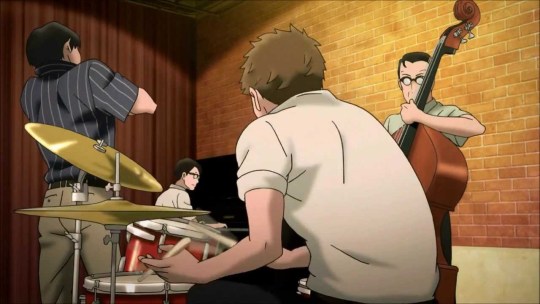
Hyouka (2012)
Energy-conservative high school student Houtarou Oreki ends up with more than he bargained for when he signs up for the Classics Club at his sister's behest—especially when he realizes how deep-rooted the club's history really is. Begrudgingly, Oreki is dragged into an investigation concerning the 45-year-old mystery that surrounds the club room.
Accompanied by his fellow club members, the knowledgeable Satoshi Fukube, the stern but benign Mayaka Ibara, and the ever-curious Eru Chitanda, Oreki must combat deadlines and lack of information with resourcefulness and hidden talent, in order to not only find the truth buried beneath the dust of works created years before them, but of other small side cases as well.
My Rating: 6/10
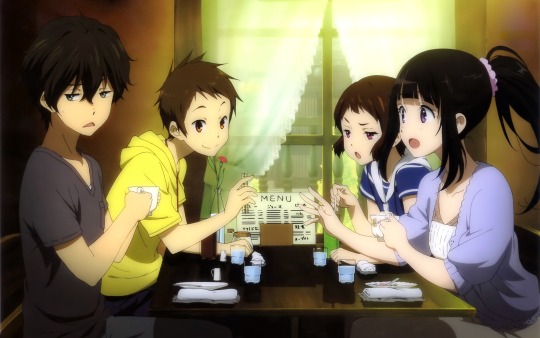
Tonari no Seki-Kun: The Master of Killing Time (2014)
I absolutely adore this show. The episodes are only about 8 minutes long, and there is very little talking, yet the story still comes through perfectly. It never fails to brighten my day when I’m feeling down.
All Rumi Yokoi wants to do is focus during school, but she is constantly distracted by Toshinari Seki, her neighboring classmate. Paying attention during class is the least of Seki's worries, as he obsesses over intricate setups created using an assortment of items, from an elaborate domino course on his desk to a treacherous war played out with shogi pieces. Yokoi desperately attempts to focus in class, only to be repeatedly sucked into his intriguing eccentricities; however, they always seem to end up with her getting in trouble with their teacher. Fortunately, lessons will never be dull with Seki's antics around!
My Rating: 9/10
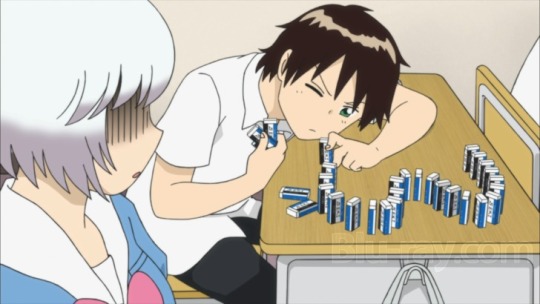
Classroom of the Elite (2017)
On the surface, Koudo Ikusei Senior High School is a utopia. The students enjoy an unparalleled amount of freedom, and it is ranked highly in Japan. However, the reality is less than ideal. Four classes, A through D, are ranked in order of merit, and only the top classes receive favorable treatment.
Kiyotaka Ayanokouji is a student of Class D, where the school dumps its worst. There he meets the unsociable Suzune Horikita, who believes she was placed in Class D by mistake and desires to climb all the way to Class A, and the seemingly amicable class idol Kikyou Kushida, whose aim is to make as many friends as possible.
While class membership is permanent, class rankings are not; students in lower ranked classes can rise in rankings if they score better than those in the top ones. Additionally, in Class D, there are no bars on what methods can be used to get ahead. In this cutthroat school, can they prevail against the odds and reach the top?
My Rating: 7/10
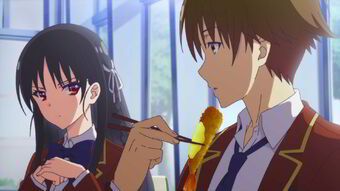
The Morose Mononokean (2016)
The start of Hanae Ashiya's high school career has not been easy—he has spent all of the first week in the infirmary, and his inexplicable condition is only getting worse. The cause of his torment is the mysterious fuzzy creature that has attached itself to him ever since he stumbled upon it the day before school began.
As his health continues to decline and the creature grows in size, Hanae comes across a flyer advertising an exorcist who expels youkai. Desperate and with nothing left to lose, he calls the number and is led to the Mononokean, a tea room which suddenly appears next to the infirmary. A morose-sounding man, Haruitsuki Abeno, reluctantly helps Hanae but demands payment afterward. Much to Hanae's dismay, he cannot afford the fee and must become an employee at the Mononokean to work off his debt. And to make things worse, his new boss is actually one of his classmates. If Hanae ever hopes to settle his debt, he must work together with Abeno to guide a variety of dangerous, strange, and interesting youkai back to the Underworld.
My Rating: 6/10
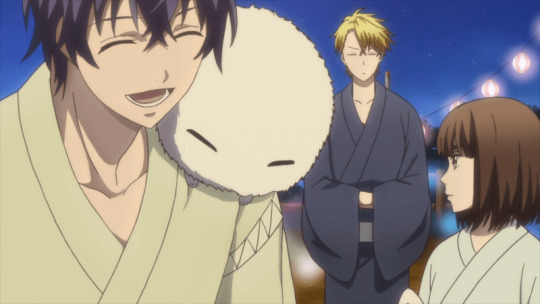
Beyond the Boundary (2013)
Another of my favorite aesthetically pleasing anime, this show has been the one that I show to friends who claim that anime cannot be beautiful (yes, several of my friends have actually said things along that line).
Mirai Kuriyama is the sole survivor of a clan of Spirit World warriors with the power to employ their blood as weapons. As such, Mirai is tasked with hunting down and killing "youmu"—creatures said to be the manifestation of negative human emotions. One day, while deep in thought on the school roof, Mirai comes across Akihito Kanbara, a rare half-breed of youmu in human form. In a panicked state, she plunges her blood saber into him only to realize that he's an immortal being. From then on, the two form an impromptu friendship that revolves around Mirai constantly trying to kill Akihito, in an effort to boost her own wavering confidence as a Spirit World warrior. Eventually, Akihito also manages to convince her to join the Literary Club, which houses two other powerful Spirit World warriors, Hiroomi and Mitsuki Nase.
As the group's bond strengthens, however, so does the tenacity of the youmu around them. Their misadventures will soon turn into a fight for survival as the inevitable release of the most powerful youmu, Beyond the Boundary, approaches.
My Rating: 7/10
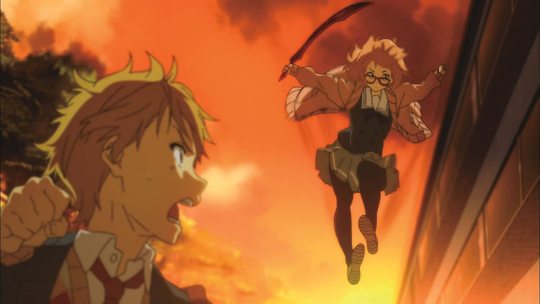
Mekakucity Actors (2014)
I think about this show far more than I’d like to admit. The way they bring different plot lines together continues to amaze me 6 years after watching it for the first time.
On the hot summer day of August 14, Shintarou Kisaragi is forced to leave his room for the first time in two years. While arguing with the cyber girl Ene who lives in his computer, Shintarou Kisaragi accidentally spills soda all over his keyboard. Though they try to find a replacement online, most stores are closed due to the Obon festival, leaving them with no other choice but to visit the local department store. Venturing outside makes Shintarou extremely anxious, but the thought of living without his computer is even worse. It's just his luck that on the day he finally goes out, he's caught in a terrifying hostage situation.
Luckily, a group of teenagers with mysterious eye powers, who call themselves the "Mekakushi Dan," assist Shintarou in resolving the situation. As a result, he is forced to join their group, along with Ene. Their abilities seem to be like pieces of a puzzle, connecting one another, and as each member's past is unveiled, the secret that ties them together is slowly brought to light.
My Rating: 8/10
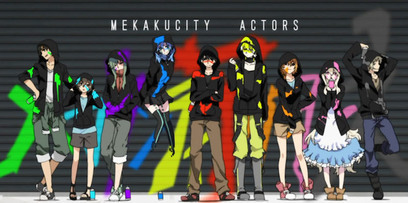
Angels of Death (2018)
You totally want to get emotionally attached to cereal killers, right? Of course you do, that’s why you should totally watch this anime.
With dead and lifeless eyes, Rachel Gardner wishes only to die. Waking up in the basement of a building, she has no idea how or why she's there. She stumbles across a bandaged murderer named Zack, who is trying to escape. After promising to kill her as soon as he is free, Rachel and Zack set out to ascend through the building floor by floor until they escape.
However, as they progress upward, they meet more twisted people, and all of them seem familiar with Rachel. What is her connection to the building, and why was she placed in it? Facing a new boss on each floor, can Rachel and Zack both achieve their wishes?
My Rating: 7/10
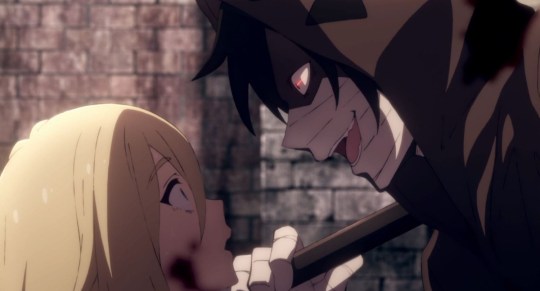
Bonus: Stars Align (2019)
I am adding one extra because this anime deserves so much more than it got. I adore every single character in this show and want nothing but to see them be happy. There is so much I adore about this show that I can’t put it all into words. I would recommend you watch this so you can share in my rage that the story was cut off halfway through with no current plans of completing it. There is no manga. There is no way of knowing what happens next. This recommendation is entirely for the purpose of generating more public outcry in the hopes that that causes them to finish the show. Please anime gods, if you are reading this I need to know what happens to my smol tennis boys. Are they safe? Are they alright?
Constantly outperformed by the girls' club, the boys' soft tennis club faces disbandment due to their poor skills and lack of positive results in matches. In desperate need of members,
Toma Shinjou is looking to recruit capable players, but he fails to scout anyone. Enter Maki Katsuragi, a new transfer student who demonstrates great reflexes when he catches a stray cat in his classroom, instantly capturing Toma's attention. With his interest piqued, Toma ambitiously asks Maki to join the boys' team but is quickly rejected, as Maki doesn't wish to join any clubs. Toma refuses to back down and ends up persuading Maki—only under the condition that Toma will pay him for his participation and cover other club expenses.
As Maki joins the team, his incredible form and quick learning allow him to immediately outshine the rest of the team. Although this gives rise to conflict among the boys, Maki challenges and pushes his fellow team members to not only keep up with his seemingly natural talent, but also drive them to devote themselves to the game they once neglected.
This story focuses on the potential of the boys' soft tennis club and their discovery of their own capability, while also enduring personal hardships and dealing with the darker side of growing up in middle school.
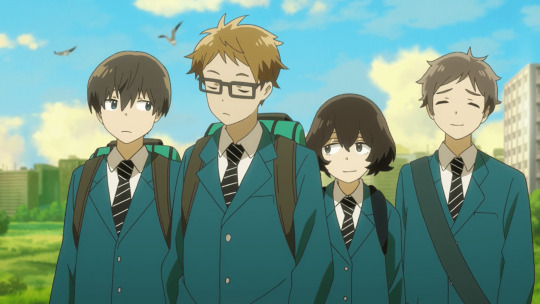
#anime#anime recommendation#zankyou no terror#terror in resonance#toilet bound hanako kun#kids on the slope#hyouka#tonari no seki kun#my neighbor seki#classroom of the elite#the morose mononokean#beyond the boundary#mekakucity actors#angels of death#stars align
79 notes
·
View notes
Text
youtube
I'm not sure if I should make this the finale post or not to be honest because I plan on playing some of the DLCs soon, so I'll make this a 'light' finale post because I'm sure I've said more than enough through my playthrough.
Morrowind genuinely surprised me. I heard all the oldguard TES fans saying it's way different and some claiming it was miles better.
Specifically I remember when Oblivion came out I heard from somewhere that Oblivion was just "dumbed down Morrowind" and kid me was like "What the heck are you talking about, Oblivion is the best game in the world (right now)???"
But man, they weren't wrong, but that's hardly what I'd point at in Morrowind in comparison.
Then again my memory of Oblivion is all rose tinted nostalgia and half memories.
What Morrowind is to me today is a fantastic fantasy game with some really interesting lore, a villain I love, a world that feels alien, troubled, imperfect and intriguing, and a gameplay cycle that felt really satisfying to me from the very start to roughly level 20 or so.
I REALLY like how pitiful and overwhelmed I felt at the start of this game- it felt fucking awesome to me and I know for some that's a weird statement and others it's the most obvious thing in the world but man is it true.
Level 1 in Morrowind as a newbie who doesn't know up from down is like waking up in the woods naked with the sound of hungry wolves all around you.
It's brutal, and exciting- every little victory- a potion, a new dagger, a new piece of armor- feels like the world to you.
I LOVED the early game in Morrowind, more than I ever liked it in Oblivion, Fallout 3, Fallout NV, Skyrim, or Fallout 4 (yeah I'm looping the bethesda engine NV in).
Because I constantly felt like I was punching up at a behemoth but I was getting away with it from time to time until I started to feel more on par with the behemoth, and eventually I overcame and hit end game and really became the behemoth and that was fun in its own right.
But I've been "mega end game god" in like 900 dang games at this point, it's always fun! And feeling like I earned it (like here) makes it feel better! But the journey often beats it and Morrowind's journey was so fun to me.
But yeah, beat the main quest. I did a lot in this game, and barely scratched the surface.
Beating it immediately made me think of how fun it would be to challenge myself to beat it- or another objective- right from the start without dumping hundreds of hours into leveling because that early game is a treat.
About the only things I didn't fully love were most of the quest designs showing their age.
Nothing super egregious, but there really was a lot of extremely simple "fetch thing" "Kill thing" "Walk to place" quests that didn't hold additional story value to make up for it.
Not to say simple is bad, but to say having a LOT of my playtime being killing various creatures for no real story reason beyond being asked to makes some actions feel pointless and like busy-work.
There were also quests that DID tie story in, which was really nice to see- things like inter-guild relations becoming a thing for some quests, or some quests having consequences further down the quest chain depending on how you completed it, and of course (as implied) some quests having multiple solutions with some of those solutions being interesting in how you find out about them.
I mean I think it's really neat how the fighter's guild has like 4 quest givers and if you blindly follow them you'll be doing all kinds of questionable stuff with questionable end goals, but if you talk to each of them you'll find that one of them is much more trustworthy and honorable than the rest, and it becomes a common loop to be sent on a quest for the FG and swing by him to ask if the quest sounds legit- AND MANY AREN'T! AND HE OFFERS ALTERNATIVE SOLUTIONS! THAT'S COOL AND LET'S YOU MAKE THE MISTAKE OF BEING TOO LOYAL AND FORGETTING YOUR MORALS BECAUSE YOU ARE "JUST PLAYING A GAME" BUT REWARDS YOU FOR QUESTIONING THAT LOYALTY AND SEEKING ALTERNATIVE SOLUTIONS! THAT'S AWESOME! Though the solution almost always being "just talk to the good guy before you do the quest" was slightly lacking, but such a cool idea.
But there wasn't a ton of this, but there also wasn't not a lot of this- it was an idea they clearly considered playing with and did when they could- I just wish there were both more and that it was used more on the menial tasks you're asked to do as well. I'm a sucker for multiple solutions is all, and consequences appearing later and altering how events play out or quests line up is always cool and I think it only happens a couple times in some guild quests if I'm not mistaken-
But again, I didn't do much in the grand scheme of things lol.
A TON of time invested and still, a metric fuckton to do including 100% of both expansions lol.
So- Morrowind. I really like this game :)
I think it's my favorite TES game, though I might change my mind whenever I revisit TES4, but I can at least say it's my favorite early game BY FAR and PROBABLY my favorite TES game.
I wonder if I can get buff enough to kill Dagoth Ur with like potion abuse. I haven't looked into it, all I know about him (and I knew before this gameplay also, I was just attacking out of curiosity) is that phase 2 rapidly regens health at like 2 billion a second or something, so you have to one shot him if at all possible.
Also I knew that he was supposed to be weaker depending on how many ash vampires you killed, but that that wasn't properly implemented (and I don't think the morrowind code patch bothers fixing it?).
Anywho- great game. I've been playing a lot of good games lately now that I think of it. I mean most of this blog is me playing good games, but I feel like, and I could be mistaken, but I feel like there was a stint there where I was playing "complicated" games and "games I don't enjoy but want to see the merit of so I'm being a sourpuss while I play".
Now I feel like the last 10 dang games were strictly good and or great. Can't say that's a bad thing :)
If you haven't ever played Morrowind before but you're familiar with say Skyrim, I'd honestly say give it a look. A look first- because it's a thick game to begin and you might be able to discern it's not for you based off a look- but a look none the less.
It's Skyrim with more RPG nonsense going on and a more brutal "rags to riches" hero story for your protag. Might be up your alley as much as it ended up being up mine :)
So up next is EITHER an entirely different game with some ocassional Morrowind posts as I touch on the expansions, or more direct Morrowind content as I emphasize the expansions until I finish them, but I'm leaning towards the former.
I think beating the main quest has earned Vaksten the Idiot a short break.
#RetPlays#Morrowind#TES#The Elder Scrolls#Also maybe I should make a new character for the expansions so I'm not OP but I dunno#might just crank the difficulty to max instead of leaving it unaltered and say that's good enough :P#Youtube
12 notes
·
View notes
Text
So this is going to be a long, overemotional/melodramatic post... but I need to get my feelings out somehow.
I've only watched ep1 so far, but I really love the look of, and am really excited for, the new Loki show.
When I first saw that some Marvel shows were coming to Disney+...okay, yes, I was definitely excited about Wandavision and Loki, because those are three of my favorite marvel characters. But at the same time, things did feel a bit like a marketing ploy. Of course Disney would make a bunch of marvel shows on their new platform--thats what'll sell. Of course they'll pick Loki, because he's really popular and that'll sell more. I wasn't even sure I'd watch Falcon and Winter Soldier. It didn't feel like I could genuinely be excited about the shows, thinking this. And, don't get me wrong, this problem is still there, no doubt about that.
But I've definitely enjoyed Wandavision and Falcon and Winter Soldier, especially the former. I thought they were solid shows.
So even though I LOVE Loki as a character...I came to the trailers with this sort of bias in mind.
Now, let me be clear, I don't just love Loki.
He was probably the first character I ever became truly obsessed with. I'm pretty sure he was the first villain character I liked, and kind of awakened my love for redeemable villains (which, if you couldn't tell by my url, stays strong today). He's a character I've loved since Thor came out in 2010. He's been in my life for ten years, and in a way shaped who I am.
I enjoy marvel overall, but pretty casually. I definitely keep up with all the movies, but I don't totally obsess over all of them. However, I still remember just how unfathomably excited I was when Dark World came out. How unbelievably happy I was to see Loki again. How I savored every joke he made, every tender moment with him, and just how happy I walked out of that theater. When I watched Ragnarok, I was older, so I wasn't quite so giddy, but that kid inside me is still there, and still jumped and grinned every time I saw him come on screen.
Needless to say, he holds an extremely special place in my heart. Even though I have characters now that I potentially like more, he's sort of been my "favorite character" for ten years, and I will always adore him.
I'm sure its been said by plenty of Loki Stans but...I absolutely hated how Infinity War went.
Don't get me wrong, I'm not mad because he died. Okay, of course I'm mad he died. But I can deal with character death. In fact, I sometimes prefer a character getting a dramatic and fulfilling death to them getting a happy ending. (And there are things I liked about his death--like, I really adored his dialogue, that he was dying for a good cause.)
But what I hated the most was that it felt like the creators didn't know his character. Loki is the god of mischief. He would never EVER launch a straight attack on a villain, no illusions, no back up plan. I'm sorry, but that's just not him at all. (Sure his plans in Avengers were more scattered and went horribly...but, firstly, he was being mind controlled so he wasn't all there, and secondly, if I remember correctly, there was still a level of mischief in his plans. He didn't generally do things straightforward. That's part of what made it fun to watch.).
(Loki wasn't the only character I felt they did this with in IW. I hated that they just had Cap live his life through time with Peggy. Not that I hate that idea itself, it's cute of course. But Cap is so incredibly selfless. He would never just do something so selfish like that...It wasn't him).
In addition to that, I felt like I saw the puppet strings so clearly in that scene. That movie was all about shock value. I don't think a movie--at least one in a franchise like marvel--should ever be made purely for shock value. It should be about what's right for the characters and the overall storyline. If there's some shock there, great. But give the audience an actually fulfilling story. Don't make your entire plan to shock and horrify the world that loves these characters/this franchise. In that scene, it truly felt like they were "Oh hey Loki's like the most beloved character, right? Lol, let's break his neck within the first five minutes to show we mean business. They'll hate that."
I'm a writer, I know the merit in going "okay, hey, we're going big here, we need to set up our villain early, and set up how this movie overall is going to go with the first scene." I know why they felt the need to kill off a character in the first five minutes.
And hell yeah I'm largely just mad because it was my fave, of course I am.
But it didn't feel like they were going "Okay does this make sense for Loki's character? Is this a good way to have him go out? Will this satisfy our audience who loves him?"
It felt like they were going "Okay let's pick the most beloved character so it'll shock, annoy, and hurt people the most."
And I'm not okay with that.
I'm just some shmuck, there's nothing I can do about that. But I'm not okay with that. I was so not okay with that, that I've pretty much hated marvel for all the years preceding Infinity War, and have not been fully excited about anything marvel related since then. I have barely interacted with Loki content since then it affected me so much.
I know it's melodramatic, but It felt like they were killing my childhood. That little piece of me that got excited every time he came on screen. That piece of me, that had been so excited to see him be on the side of the villains in infinity war, because it just meant I got to see him. It truly felt like a small part of me died when I watched him die.
So when the Loki trailers came out? In a weird way ....I couldn't even be excited.
They were bringing him back, potentially erasing the problem I have with Infinity War. And yet...I couldn't be excited.
First off, when I saw what happened with him in Endgame (it made me extremely happy and hopeful, let me tell you, but it obviously didn't fix everything) I was kind of under the impression he'd just be causing mischief throughout space and time for the show, and I was absolutely here for it.
So when I saw the trailers were him getting caught immediately, and then recruited for the side of the good guys...I was like "okay so...the same plot as other Marvel movies? The plot of Ragnarok again? He gets stranded on an alien planet, and has to work for the leaders. There's lots of fighting, like there is in every other marvel movie, which is the part I least care about." When I saw the trailers I didn't get to see Loki being himself at all. I saw other people controlling him, and then him working for the good guys. That's not Loki. Loki is mischief. Loki works for himself. Loki fights, yeah, but his character actually has depth and emotion to it, he's not just for brainless fighting. (And whoo boy let me tell you I was mad when I saw the DB Cooper part of the trailer and thought they chopped his wonderful hair off when they made him a good guy, like they were totally changing his identity. And also let me tell you the SHEER RELIEF I felt when I found it was just a tiny scene, and his wonderful hair will remain (please God let it remain)).
So here I was thinking "great, its infinity war all over again. I'm gonna have a whole show of them not knowing and staying true to his character."
Even though that little kid inside of me was still there. Even though that little kid was going "Dude! Dude! It's Loki! An entire show about Loki! You won't have to wait for him to show up on screen, he'll just always be on screen! He'll be the protagonist! Do you realize how much I would have loved this if I got to see it years earlier?" I was so tired, and so mad.
But now I've watched the first episode.
And for the first time since infinity war...I felt like I could breathe again.
Here I thought they'd forgotten his character. They forgot that he's the god of mischief, that he's funny, that he's, well (to use the words of Thomas Sharpe)...absurdly sentimental.
And they didn't at all.
From minute one he's himself, wanting to rule the world, cracking jokes, refusing to be controlled, causing mischief when and where he can. They actually showed the progression of why he'd be willing to work for them really well.
And gosh I loved that scene where he sees what his life would be like. From the moment Mobius started showing him scenes from his life, I was desperately hoping he'd be left alone with the device and get to see more of his life, and desperately hoped he'd see and react to his death.
And they did not disappoint.
They remembered. They remembered that he's ambitious, that he's not controlled, they remembered that he's funny and mischievous, and that he's a special marvel character, that you can actually get deep and emotional with. They remembered all of it.
Watching Loki watch his own death was like taking all those years of anger, and for one brief moment melting them away. I felt like I wasn't alone anymore. Wasn't alone in going "hey that's not Loki." Loki himself was watching it, and could judge that for himself. And most importantly, it was confirming before my eyes that it was no longer was his end.
And him being the villain and the hero? I cannot explain to you how much I love that idea. How much and how well that keeps in line with his character. A great premise and protagonist can make for a poor story if it has a poor villain, and, to be fair I haven't seen how it goes, but that seems like the perfect--and perhaps only--villain who could make this show absolutely stellar. I'd love to see them explore that Avengers-level villainousness, with him also being a hero like we see at the end of Ragnarok. It'd be fun to see his two sides trying to convince each other to join them. It would truly feel like they understand all aspects of his character.
I'm older now, so I don't get nearly as excited about things as I used to. I wish I did. I almost wish this came out when I was younger so I could be more excited. But that kid is still inside of me, and I'm so excited to see him on screen all the time.
Now...I don't really care so much if it's all about the money.
It's a whole show about Loki. I don't have to wait for him to come on screen, he's just there.
This feel like more of a relief than I can possibly express.
(@mylokabrennauniverse @annievvv7 I’d be curious to hear your thoughts/if you’ve felt similarly!!)
#loki#loki tv series#loki tv series spoilers#loki tv#loki series#loki laufeyson#marvel#mcu#marvel loki#loki mcu#loki show#marvel mcu#loki marvel#mcu loki#thor#thor the dark world#thor ragnarok#infinity war
12 notes
·
View notes
Text
I’m doing this for fun simply because I'm rewatching them all so,
Here's my personal ranking for Every Gorillaz Music video, based both on song and the video itself:
(This is going to be a long post)
PHASE ONE:
Tomorrow Comes Today: 7/10. I love this song and the video fits its vibe, but its still pretty simplistic and not a whole lot of actual animation and no story, so it gets points off for that.
Clint Eastwood: 10/10. I love this one honestly. Its still so charming after all this time and showcases the band well for their early days. Love the more moody tone of it, and I always love seeing the band actually play instruments in their videos too. Bonus points for Murdoc's laugh opening this one because I love that.
Rock The House: 9/10. Pure fun. I don't have a lot of commentary for it, I just think its fun and I love the song itself too. One point off for Murdoc thrusting his hips too many times for my eyes tho.
19-2000: 10/10. This one was the first Gorillaz video that I saw and it really is just a nice non plot connected video. The 3D animation still manages to hold up because of its mix with 2D animation in my opinion and I enjoy it.
Rockit: 5/10. I like the song but the video is kinda meh.
PHASE ONE MV'S OVERALL: Overall I like phase one and I miss Del. Bring him back.
PHASE TWO:
Dirty Harry: 8/10. 2D is just vibing so hard in this video and I'm living for it. That’s all that matters. (Side note but I love the version of this video they did for the BRIT's as well.)
DARE: 10/10. Noodles time to shine, a perfect song, what more could you ask for?? (Also love the bit with Murdoc at the end of course.)
Feel Good Inc: 10/10. This one is obvious if you know me at all. Murdoc playing his bass is what sells this one for me cause I enjoy the animation. The songs amazing and one I find comforting to listen to, and the mood of the video fits it perfectly. Theres some really fun shots with lighting while 2D is standing at the window too in the tower in here that I've always liked.
El Mañana: 6/10. I love this song but it makes me sad and so does the video.
PHASE TWO MV'S OVERALL: Phase One is iconic for its art style and for being The Beginning, but Phase Two is my favorite of the two for its art. I love how these videos are animated, and even if Demon Dayz is my least favorite album, the songs in these videos are all very good. Pretty solid as a whole all things considered.
PHASE THREE:
Stylo: 10/10 LISTEN, I KNOW SOME PEOPLE HATE THE CGI, BUT I LOVE IT. It’s so expressive, this song is one of my absolute faves, I’m sorry to be such a Murdoc liker but hes so much fun in this video and so expressive and it starts the story off for Plastic Beach. I love it so much.
On Melancholy Hill: 7/10. It’s not a bad video, and I love the song a lot, but...not a lot actually happens in the video aside from the bits with Noodle. Bonus points however go to just how seamlessly it puts 2D and 3D animation together, and for how cute 2D looks this whole video.
Rhinestone Eyes: 9/10. WOULD BE A 10/10 IF WE’D GOTTEN OFFICIAL ANIMATION FOR IT ;-; (The fan animated video for it tho is Very very good and i applaud that whole team.) Amazing song, this video has the most story packed into it so far from all the other videos and it’s memorable from its storyboards for that alone.
Doncamatic: 10/10 Listen...Listen I know its a one off and it doesn't really have anything in it but I’m obsessed because its one of my favorite Gorillaz songs tbh and I love Daley’s outfit in it so it gets a full pass from it.
PHASE THREE MV’S OVERALL: I love every video this phase tbh, none of them are bad. All of them are fun,and even if Melancholy Hill is a little slow, it’s still enjoyable. I love this phase because they all connect and I know I’m not the only one who feels that way either.
PHASE FOUR:
Hallelujah Money: 7/10. It’s not at all bad, but I’m as not fond of this song, and the video itself is much too trippy for me. Still has its own merits tho that I won’t knock it for even if it’s not my personal taste.
Saturn Barz: 10/10. Everything about this video is amazing. Character designs and as a comeback for the bands animated counterparts, it was perfect. I loved hearing them actually speak again too it made the whole thing so fun. The song is fuckin awesome and it fits the vibe of the whole video. Bonus points for the more lineless animation style they gave everyone in this video, it was a really neat change from past phases. My one complaint is again stop making me see so much naked Murdoc, I may like him but not like that.
Sleeping Powder: 6/10. I am so split when it comes to the mo cap models. This songs good but the video is again too trippy for me.
Strobalite: 9/10. Would have been 10/10 if Russel got to dance with 2D and Noodle, but other than that its pretty damn good. The mo cap looks way less awkward in here, particularly Murdoc and Russel. Also hilarious that Murdoc made a deal with the devil, and the guy who played him is actually his voice actor irl. This songs too much fun to vibe to as well.
PHASE FOUR MV’S OVERALL: Not much for story, but makes up for it in updated art and great music again. Solid overall yet again. I like it.
PHASE FIVE:
Humility: 20/10. Literally every single person I know who’s seen this video loved it. The animation is Beautiful, the song is so fuckin catchy, Jack Black is in it! What more do you want!! (The only thing I could have asked for was to see more of Ace but that’s its only flaw.)
Tranz: 9/10. I love this song so much but this video is Again just a little too trippy for me. However, we get to see Ace just jamming out in this video and I’ll take the trippiness just for that.
PHASE FIVE MV’S OVERALL: I was surprised there wasn't at least one more video for this phase honestly? I feel like Kansas or Souk Eye would have made for great videos for this phase. That aside tho, both the videos it does have are a lot of fun. My literal only complaint is that I wanted to see more of Ace. Bring him back in the future.
PHASE SIX:
Momentary Bliss: 8/10. This songs fine, but what sells it for me is the video is more slice of life/a day in the life of the studio. I’m always a fan of those moments. Bonus points goes to Murdoc trying to fuckin poison Jamie and it backfiring on him.
Désolé: 10/10: ooooh this song is so beautiful...I love it so much. 2D Noodle and Russel got to have such a fun time in this video and they deserve it. And poor Murdoc, having his little sad times by his asshole self. I love him but I think he deserved it. The others needed a good break from the bullshit and I’m glad they got it.
Aries: 6/10. Video itself is kinda boring, but the song is nice. Murdoc deserved to be left behind in Désolé after what he tried to pull here.
Friday the 13th: 3/10. I don’t care for this video and I really don’t care for the song. Not much else to say.
PAC-MAN: 6/10. Video’s fine, I like some of the little details in it, but it’s nothing special. The song itself is nice tho, super calming, I like it.
Strange Timez: 20/20 MY GOD I LOVE THIS ONE SO MUCH...VISUALS ARE SO FUN, I LOVE ROBERT SMITH SO I LOVE HIM IN HERE, ITS JUST A GOOD TIME ALL AROUND!
The Pink Phantom: 5/10 I just don’t really care for this song?? I like Elton John but I couldn’t get myself to like this one no matter how many times I’ve listened. 2D got to be happy in this video tho so I’ll give it a pass.
The Valley of the Pagans: 6/10. This song fuckin slaps but the video feels like a boring redo of 19-2000 except for it’s ending. It gets points for giving everyone Plastic Beach feelings at the end and hyping up the video after it.
The Lost Chord: 20/20. Y’all knew this was coming. This was something I’d BEEN hoping for story wise and I finally got it. Was it maybe a little rushed? Yes. But GOD it was such a nice thing to see them say “hey we’ve wrapped up this part of the story for good and want everyone to move on from it, so we’ve given it a properly acknowledged final send off.” And tangibly seeing everyone's emotions laid out about the island and their times there was very nice. And I know Jamie and Damon have stated Murdoc is irredeemable, blah blah yes I know hes an asshole still, but I WILL think about Murdoc in this video and how he seemed actually regretful and what that means to me and the fact that it was no one else but 2D himself being the one to reach out to Murdoc in the end to save him until my dying breath, thank you very much. And this song?? Fuckin beautiful, it had those Plastic Beach vibes again and felt good for it’s send off song, I love it.
PHASE SIX MV’S OVERALL: I may be a little split on some of them and on Song Machine as a whole, but tbh I love the phase six art style so much and most times the videos were pretty good. Bringing back PB in the end was something I always wanted too so it really does get bonus points from me for that. I’m 50/50 on them overall. The great ones are great, and the meh ones are just kinda boring, so it evens out in the end.
STAND ALONE VIDEOS MENTION:
Do Ya Thing: 10/10. I’ve said before I love the 3D animation and the slice of life stuff, so this one’s obviously a favorite, and you really cant go wrong with an Andre 3000 feature either.
Superfast Jellyfish: 3/10. This song is kinda fun but I don’t give a single shit about the music video.
Garage Palace: 8/10. Very fun pixel visuals for a change along with a killer song, super enjoyable.
So what’s my final verdict on Gorillaz and their long music video history?
Honestly for a group thats been going as long as they have, I dont think they have too many misses in their catalog. The ones that aren’t as fun are just kinda there, but the videos that really stand out stand out far above the ones that don’t hit the mark as well and in the end it all feels like a good balance. No band has a perfect video every time, but the ones that Gorillaz did well they did amazing on and I enjoy it immensely when that happens.
Sidenotes after watching all of those:
For the love of god please put Russel in the videos more, please, he deserves it and I would love to see him more.
On that note, BRING DEL BACK WITH HIM TOO!!
And speaking of characters to bring back, I want Ace to come back and join Murdoc sometimes, even if its only once or twice more, I need to see them interact PLEASE.
Last note but Jamie, please, I’m begging, show less of mostly naked or fully naked of Murdoc in future videos, we’ve had our fill by now.
#can you tell im hyperfixating again??? anyways#kief rambles about gorillaz#gorillaz#this was fun but good lord
19 notes
·
View notes